Definition Essay


Definition Essay - Writing Guide, Examples and Tips
14 min read
Published on: Oct 9, 2020
Last updated on: Jan 31, 2024

People also read
Interesting Definition Essay Topics for Students
Definition Essay Outline - Format & Guide
Share this article
Many students struggle with writing definition essays due to a lack of clarity and precision in their explanations.
This obstructs them from effectively conveying the essence of the terms or concepts they are tasked with defining. Consequently, the essays may lack coherence, leaving readers confused and preventing them from grasping the intended meaning.
But don’t worry!
In this guide, we will delve into effective techniques and step-by-step approaches to help students craft an engaging definition essay.
Continue reading to learn the correct formation of a definition essay.

Paper Due? Why Suffer? That's our Job!
On This Page On This Page -->
What is a Definition Essay?
Just as the name suggests, a definition essay defines and explains a term or a concept. Unlike a narrative essay, the purpose of writing this essay is only to inform the readers.
Writing this essay type can be deceivingly tricky. Some terms, concepts, and objects have concrete definitions when explained. In contrast others are solely based on the writerâs understanding and point of view.
A definition essay requires a writer to use different approaches when discussing a term. These approaches are the following:
- Denotation - It is when you provide a literal or academic definition of the term.
- Connotation - It is when the writer provides an implied meaning or definition of the term.
- Enumeration - For this approach, a list is employed to define a term or a concept.
- Analogy - It is a technique in which something is defined by implementing a comparison.
- Negation - It is when you define a term by stating what it is not.
A single or combination of approaches can be used in the essay.
Definition Essay Types
There are several types of definition essays that you may be asked to write, depending on the purpose and scope of the assignment.
In this section, we will discuss some of the most common types of definition essays.
Descriptive Definition Essay
This type of essay provides a detailed description of a term or concept, emphasizing its key features and characteristics.
The goal of a descriptive definition essay is to help readers understand the term or concept in a more profound way.
Stipulative Definition Essay
In a stipulative definition essay, the writer provides a unique definition of a term or concept. This type of essay is often used in academic settings to define a term in a particular field of study.
The goal of a stipulative definition essay is to provide a precise and clear definition that is specific to the context of the essay.
Analytical Definition Essay
This compare and contrast essay type involves analyzing a term or concept in-depth. Breaking it down into its component parts, and examining how they relate to each other.
The goal of an analytical definition essay is to provide a more nuanced and detailed understanding of the term or concept being discussed.
Persuasive Definition Essay
A persuasive definition essay is an argumentative essay that aims to persuade readers to accept a particular definition of a term or concept.
The writer presents their argument for the definition and uses evidence and examples to support their position.
Explanatory Definition Essay
An explanatory definition essay is a type of expository essay . It aims to explain a complex term or concept in a way that is easy to understand for the reader.
The writer breaks down the term or concept into simpler parts and provides examples and analogies to help readers understand it better.
Extended Definition Essay
An extended definition essay goes beyond the definition of a word or concept and provides a more in-depth analysis and explanation.
The goal of an extended definition essay is to provide a comprehensive understanding of a term, concept, or idea. This includes its history, origins, and cultural significance.
How to Write a Definition Essay?
Writing a definition essay is simple if you know the correct procedure. This essay, like all the other formal pieces of documents, requires substantial planning and effective execution.
The following are the steps involved in writing a definition essay effectively:
Instead of choosing a term that has a concrete definition available, choose a word that is complicated . Complex expressions have abstract concepts that require a writer to explore deeper. Moreover, make sure that different people perceive the term selected differently.
Once you have a word to draft your definition essay for, read the dictionary. These academic definitions are important as you can use them to compare your understanding with the official concept.
Drafting a definition essay is about stating the dictionary meaning and your explanation of the concept. So the writer needs to have some information about the term.
In addition to this, when exploring the term, make sure to check the termâs origin. The history of the word can make you discuss it in a better way.
Coming up with an exciting title for your essay is important. The essay topic will be the first thing that your readers will witness, so it should be catchy.
Creatively draft an essay topic that reflects meaning. In addition to this, the usage of the term in the title should be correctly done. The readers should get an idea of what the essay is about and what to expect from the document.
Now that you have a topic in hand, it is time to gather some relevant information. A definition essay is more than a mere explanation of the term. It represents the writerâs perception of the chosen term and the topic.
So having only personal opinions will not be enough to defend your point. Deeply research and gather information by consulting credible sources.
The gathered information needs to be organized to be understandable. The raw data needs to be arranged to give a structure to the content.
Here's a generic outline for a definition essay:
Are you searching for an in-depth guide on crafting a well-structured definition essay?Check out this definition essay outline blog!
6. Write the First Draft
Drafting each section correctly is a daunting task. Understanding what or what not to include in these sections requires a writer to choose wisely.
The start of your essay matters a lot. If it is on point and attractive, the readers will want to read the text. As the first part of the essay is the introduction , it is considered the first impression of your essay.
To write your definition essay introduction effectively, include the following information:
- Start your essay with a catchy hook statement that is related to the topic and the term chosen.
- State the generally known definition of the term. If the word chosen has multiple interpretations, select the most common one.
- Provide background information precisely. Determine the origin of the term and other relevant information.
- Shed light on the other unconventional concepts and definitions related to the term.
- Decide on the side or stance you want to pick in your essay and develop a thesis statement .
After briefly introducing the topic, fully explain the concept in the body section . Provide all the details and evidence that will support the thesis statement. To draft this section professionally, add the following information:
- A detailed explanation of the history of the term.
- Analysis of the dictionary meaning and usage of the term.
- A comparison and reflection of personal understanding and the researched data on the concept.
Once all the details are shared, give closure to your discussion. The last paragraph of the definition essay is the conclusion . The writer provides insight into the topic as a conclusion.
The concluding paragraphs include the following material:
- Summary of the important points.
- Restated thesis statement.
- A final verdict on the topic.
7. Proofread and Edit
Although the writing process ends with the concluding paragraph, there is an additional step. It is important to proofread the essay once you are done writing. Proofread and revise your document a couple of times to make sure everything is perfect.
Before submitting your assignment, make edits, and fix all mistakes and errors.
If you want to learn more about how to write a definition essay, here is a video guide for you!
Definition Essay Structure
The structure of a definition essay is similar to that of any other academic essay. It should consist of an introduction, body paragraphs, and a conclusion.
However, the focus of a definition essay is on defining and explaining a particular term or concept.
In this section, we will discuss the structure of a definition essay in detail.
Introduction
Get the idea of writing an introduction for a definition essay with this example:
Body Paragraphs
Here is an example of how to craft your definition essay body paragraph:
Types of the Term/Concept
If applicable, the writer may want to include a section that discusses the different types or categories of the term or concept being defined.
This section should explain the similarities and differences between the types, using examples and anecdotes to illustrate the points.
Examples of the Term/Concept in Action
The writer should also include real-life examples of the term or concept being defined in action.
This will help the reader better understand the term or concept in context and how it is used in everyday life.
Conclusion
This example will help you writing a conclusion fo you essay:
Definition Essay Examples
It is important to go through some examples and samples before writing an essay. This is to understand the writing process and structure of the assigned task well.
Following are some examples of definition essays to give our students a better idea of the concept.
Understanding the Definition Essay
Definition Essay Example
Definition Essay About Friendship
Definition Essay About Love
Family Definition Essay
Success Definition Essay
Beauty Definition Essay
Definition Essay Topics
Selecting the right topic is challenging for other essay types. However, picking a suitable theme for a definition essay is equally tricky yet important. Pick an interesting subject to ensure maximum readership.
If you are facing writerâs block, here is a list of some great definition essay topics for your help. Choose from the list below and draft a compelling essay.
- Authenticity
- Sustainability
- Mindfulness
Here are some more extended definition essay topics:
- Social media addiction
- Ethical implications of gene editing
- Personalized learning in the digital age
- Ecosystem services
- Cultural assimilation versus cultural preservation
- Sustainable fashion
- Gender equality in the workplace
- Financial literacy and its impact on personal finance
- Ethical considerations in artificial intelligence
- Welfare state and social safety nets
Need more topics? Check out this definition essay topics blog!
Definition Essay Writing Tips
Knowing the correct writing procedure is not enough if you are not aware of the essayâs small technicalities. To help students write a definition essay effortlessly, expert writers of CollegeEssay.org have gathered some simple tips.
These easy tips will make your assignment writing phase easy.
- Choose an exciting yet informative topic for your essay.
- When selecting the word, concept, or term for your essay, make sure you have the knowledge.
- When consulting a dictionary for the definition, provide proper referencing as there are many choices available.
- To make the essay informative and credible, always provide the origin and history of the term.
- Highlight different meanings and interpretations of the term.
- Discuss the transitions and evolution in the meaning of the term in any.
- Provide your perspective and point of view on the chosen term.
Following these tips will guarantee you better grades in your academics.
By following the step-by-step approach explained in this guide, you will acquire the skills to craft an outstanding essay.
Struggling with the thought, " write my college essay for m e"? Look no further.
Our dedicated definition essay writing service is here to craft the perfect essay that meets your academic needs.
For an extra edge, explore our AI essay writer , a tool designed to refine your essays to perfection.
Barbara P (Literature, Marketing)
Barbara is a highly educated and qualified author with a Ph.D. in public health from an Ivy League university. She has spent a significant amount of time working in the medical field, conducting a thorough study on a variety of health issues. Her work has been published in several major publications.
Paper Due? Why Suffer? That’s our Job!

Keep reading

Legal & Policies
- Privacy Policy
- Cookies Policy
- Terms of Use
- Refunds & Cancellations
- Our Writers
- Success Stories
- Our Guarantees
- Affiliate Program
- Referral Program
- AI Essay Writer
Disclaimer: All client orders are completed by our team of highly qualified human writers. The essays and papers provided by us are not to be used for submission but rather as learning models only.
How to Write a Definition Essay: New Guide with Samples

Have you ever found it difficult to explain certain words or ideas? That's because understanding them isn't always easy. To avoid confusion, it's important to really understand the words we use and be able to explain them well.
That's why teachers often assign definition essays in high school and college. But these essays aren't just about repeating dictionary definitions. They dive deep into complex terms, exploring their rich backgrounds and meanings.
In this article, our rewrite essay service will cover different types of these papers, give you practical tips for writing them, and even provide examples to simplify this journey for you!
What is a Definition Essay
A definition essay is a type of writing assignment where you explain the meaning of a specific word or concept. Instead of just giving a simple definition from the dictionary, you dive deeper into what the word really means and explore its different aspects.
For instance, if you're tasked with defining 'success,' you might discuss what success means to different people, how it can vary based on cultural or societal norms, and whether it's purely based on achievements or encompasses personal fulfillment as well.
The purpose of writing definition essays in school is multifaceted. Firstly, it helps you refine your understanding of language by encouraging you to analyze words more critically. It also fosters your ability to think deeply and express complex ideas clearly. Additionally, it cultivates your skills in research, as you may need to gather evidence and examples to support your interpretation of the word or concept. Now that we've cleared the definition essay meaning, let's explain its common types in detail.
Definition Essay Examples
Here's a definition essay example from our custom essay service to help you understand what a good paper looks like. Take a look at how it's structured and formatted if you want to use it as a reference for your own work. And if you're interested, you can always buy essay cheap and get high-quality paper from our platform anytime.
Stuck on Words?
Our writers excel at turning ordinary ideas into extraordinary narratives.
Commonly Used Definition Essay Types
When choosing an intriguing term with a rich historical background for your definition essay, it's essential to carefully consider your options and determine the most effective approach. Here are some common types, as suggested by our dissertation writing help :
.webp)
- Analysis : Break down the topic into its constituent parts and define each part separately.
- Classification : Determine the categories under which the topic can be classified.
- Comparison : Highlight the uniqueness of the topic by comparing and contrasting it with more common subjects.
- Details : Identify the key traits and distinctive qualities that best encapsulate the central idea of your essay.
- Negation : Clarify what your topic is, not to narrow down its definition.
- Origins and Causes : Explore the historical origins and background of the concept, examining where it first appeared and any relevant historical details.
- Results, Effects, and Uses : Discuss the consequences, effects, and practical applications of the subject matter.
How to Write a Definition Essay
Just like with any writing, a definition essay structure involves an introduction, body, and conclusion. But what makes it interesting is what you explore in the body paragraphs.
For example, you could organize your definition essay outline by discussing the term from various angles. Start with a personal anecdote or story that illustrates the term in action. Then, provide a definition from a reputable source like a textbook or scholarly article. Next, consider interviewing people from different backgrounds to get their perspectives on the term. You could also analyze how the term has evolved over time, looking at historical examples or cultural shifts. Finally, offer your own interpretation of the term, drawing on your own experiences and insights.
For a more in-depth guide on writing a definition essay, let's explore the following sections provided by our experienced research paper writer .
Definition Essay Introduction
In the beginning stages of a definition essay, your reader gets their first taste of what your topic entails. It's crucial that this introduction is both informative and captivating, setting the stage for the rest of your essay. Here's what you need to include:
- Start with something attention-grabbing, like a thought-provoking question or an interesting fact.
- Provide a brief overview of the topic and why it's important to define it.
- Clearly state the term you're defining and your interpretation of it.
Definition Essay Body Paragraphs
In your essay, break down the phrase into its different parts, look at it from various angles, and then provide a relevant explanation. Depending on what your assignment calls for, you might need more than three paragraphs. Feel free to mix up the order or add sections depending on how complex the term is. Here are some ideas for what you can include:
- Start by talking about where the term came from and how it has changed over time. Understanding its origins can give insight into its meaning and significance.
- Look up the official definition of the term and compare it to your own understanding. This can help clarify any differences and give a broader perspective.
- Share your own thoughts and interpretation of the term, using examples or stories to illustrate your point. Your personal experiences can add depth and context to your analysis.
- Find a definition or explanation from an expert or scholar in the field and discuss how it aligns or differs with your own perspective. This can provide credibility and further insight into the term.
- Explore how the term is used in popular culture and what it reveals about societal values and beliefs. This can shed light on how the term is understood and interpreted in different contexts.
Definition Essay Conclusion
In the concluding paragraph, you should tie everything together neatly. Here's how you can structure your conclusion:
- Remind the reader of your main points and why the definition of the term is important.
- Highlight how having a clear understanding of the term can influence our thoughts and actions. This is where you show the broader significance of your analysis.
- Encourage your audience to apply the term accurately in their own discussions and advocate for precision in defining terms within their communities. This empowers readers to take action based on what they've learned.
Tips for Definition Essay Writing Process
Now that we're nearing the end, you might have already grasped how to write a definition essay. However, if you still feel like you're threading a needle while wearing mittens, fear not! Our essay writer has laid out some nifty guidelines to help you ace this challenge:
.webp)
- Choose a term with depth, something that's not ordinary but has a rich backstory and multiple meanings. Think of it like picking a word that's like a Russian nesting doll – there's plenty to explore.
- Use vivid language to paint a picture that engages the senses. For instance, when talking about 'love,' describe the warmth of a hug, the sweetness of Valentine's chocolates, or the sound of laughter with a partner. It helps your readers feel like they're right there with you.
- Explore both the positive and negative associations of your term. Words aren't simple; they come with different meanings. For example, 'power' can mean strength and influence but can also be linked to negative things like abuse and control.
- Use real-life examples to make your points clear in your definition essay. Whether you're talking about successful people from different fields or sharing stories that illustrate 'love,' concrete examples help readers understand.
- Be creative with your approach. Use metaphors, illustrations, or humor to keep things interesting. Remember, it's your essay – make it come alive!
Final Words
As we wrap up, we trust you've grasped the ins and outs of how to write a definition essay and feel inspired to tackle your own. Nobody wants to be left scratching their head over complex topics, right? So why not leverage our academic writing assistance to your advantage? Whether you need help brainstorming extended topics, crafting a sharp analytical piece, or any other form of writing, we've got you covered. Say goodbye to confusion and ignorance – Order essay and let us guide you toward clarity and knowledge.
Want to Get Your Task Done ASAP?
Leave us a notice and get help from professional writers!

Daniel Parker
is a seasoned educational writer focusing on scholarship guidance, research papers, and various forms of academic essays including reflective and narrative essays. His expertise also extends to detailed case studies. A scholar with a background in English Literature and Education, Daniel’s work on EssayPro blog aims to support students in achieving academic excellence and securing scholarships. His hobbies include reading classic literature and participating in academic forums.

is an expert in nursing and healthcare, with a strong background in history, law, and literature. Holding advanced degrees in nursing and public health, his analytical approach and comprehensive knowledge help students navigate complex topics. On EssayPro blog, Adam provides insightful articles on everything from historical analysis to the intricacies of healthcare policies. In his downtime, he enjoys historical documentaries and volunteering at local clinics.
Related Articles
.webp)
Developing a Thesis Statement
Many papers you write require developing a thesis statement. In this section you’ll learn what a thesis statement is and how to write one.
Keep in mind that not all papers require thesis statements . If in doubt, please consult your instructor for assistance.
What is a thesis statement?
A thesis statement . . .
- Makes an argumentative assertion about a topic; it states the conclusions that you have reached about your topic.
- Makes a promise to the reader about the scope, purpose, and direction of your paper.
- Is focused and specific enough to be “proven” within the boundaries of your paper.
- Is generally located near the end of the introduction ; sometimes, in a long paper, the thesis will be expressed in several sentences or in an entire paragraph.
- Identifies the relationships between the pieces of evidence that you are using to support your argument.
Not all papers require thesis statements! Ask your instructor if you’re in doubt whether you need one.
Identify a topic
Your topic is the subject about which you will write. Your assignment may suggest several ways of looking at a topic; or it may name a fairly general concept that you will explore or analyze in your paper.
Consider what your assignment asks you to do
Inform yourself about your topic, focus on one aspect of your topic, ask yourself whether your topic is worthy of your efforts, generate a topic from an assignment.
Below are some possible topics based on sample assignments.
Sample assignment 1
Analyze Spain’s neutrality in World War II.
Identified topic
Franco’s role in the diplomatic relationships between the Allies and the Axis
This topic avoids generalities such as “Spain” and “World War II,” addressing instead on Franco’s role (a specific aspect of “Spain”) and the diplomatic relations between the Allies and Axis (a specific aspect of World War II).
Sample assignment 2
Analyze one of Homer’s epic similes in the Iliad.
The relationship between the portrayal of warfare and the epic simile about Simoisius at 4.547-64.
This topic focuses on a single simile and relates it to a single aspect of the Iliad ( warfare being a major theme in that work).
Developing a Thesis Statement–Additional information
Your assignment may suggest several ways of looking at a topic, or it may name a fairly general concept that you will explore or analyze in your paper. You’ll want to read your assignment carefully, looking for key terms that you can use to focus your topic.
Sample assignment: Analyze Spain’s neutrality in World War II Key terms: analyze, Spain’s neutrality, World War II
After you’ve identified the key words in your topic, the next step is to read about them in several sources, or generate as much information as possible through an analysis of your topic. Obviously, the more material or knowledge you have, the more possibilities will be available for a strong argument. For the sample assignment above, you’ll want to look at books and articles on World War II in general, and Spain’s neutrality in particular.
As you consider your options, you must decide to focus on one aspect of your topic. This means that you cannot include everything you’ve learned about your topic, nor should you go off in several directions. If you end up covering too many different aspects of a topic, your paper will sprawl and be unconvincing in its argument, and it most likely will not fulfull the assignment requirements.
For the sample assignment above, both Spain’s neutrality and World War II are topics far too broad to explore in a paper. You may instead decide to focus on Franco’s role in the diplomatic relationships between the Allies and the Axis , which narrows down what aspects of Spain’s neutrality and World War II you want to discuss, as well as establishes a specific link between those two aspects.
Before you go too far, however, ask yourself whether your topic is worthy of your efforts. Try to avoid topics that already have too much written about them (i.e., “eating disorders and body image among adolescent women”) or that simply are not important (i.e. “why I like ice cream”). These topics may lead to a thesis that is either dry fact or a weird claim that cannot be supported. A good thesis falls somewhere between the two extremes. To arrive at this point, ask yourself what is new, interesting, contestable, or controversial about your topic.
As you work on your thesis, remember to keep the rest of your paper in mind at all times . Sometimes your thesis needs to evolve as you develop new insights, find new evidence, or take a different approach to your topic.
Derive a main point from topic
Once you have a topic, you will have to decide what the main point of your paper will be. This point, the “controlling idea,” becomes the core of your argument (thesis statement) and it is the unifying idea to which you will relate all your sub-theses. You can then turn this “controlling idea” into a purpose statement about what you intend to do in your paper.
Look for patterns in your evidence
Compose a purpose statement.
Consult the examples below for suggestions on how to look for patterns in your evidence and construct a purpose statement.
- Franco first tried to negotiate with the Axis
- Franco turned to the Allies when he couldn’t get some concessions that he wanted from the Axis
Possible conclusion:
Spain’s neutrality in WWII occurred for an entirely personal reason: Franco’s desire to preserve his own (and Spain’s) power.
Purpose statement
This paper will analyze Franco’s diplomacy during World War II to see how it contributed to Spain’s neutrality.
- The simile compares Simoisius to a tree, which is a peaceful, natural image.
- The tree in the simile is chopped down to make wheels for a chariot, which is an object used in warfare.
At first, the simile seems to take the reader away from the world of warfare, but we end up back in that world by the end.
This paper will analyze the way the simile about Simoisius at 4.547-64 moves in and out of the world of warfare.
Derive purpose statement from topic
To find out what your “controlling idea” is, you have to examine and evaluate your evidence . As you consider your evidence, you may notice patterns emerging, data repeated in more than one source, or facts that favor one view more than another. These patterns or data may then lead you to some conclusions about your topic and suggest that you can successfully argue for one idea better than another.
For instance, you might find out that Franco first tried to negotiate with the Axis, but when he couldn’t get some concessions that he wanted from them, he turned to the Allies. As you read more about Franco’s decisions, you may conclude that Spain’s neutrality in WWII occurred for an entirely personal reason: his desire to preserve his own (and Spain’s) power. Based on this conclusion, you can then write a trial thesis statement to help you decide what material belongs in your paper.
Sometimes you won’t be able to find a focus or identify your “spin” or specific argument immediately. Like some writers, you might begin with a purpose statement just to get yourself going. A purpose statement is one or more sentences that announce your topic and indicate the structure of the paper but do not state the conclusions you have drawn . Thus, you might begin with something like this:
- This paper will look at modern language to see if it reflects male dominance or female oppression.
- I plan to analyze anger and derision in offensive language to see if they represent a challenge of society’s authority.
At some point, you can turn a purpose statement into a thesis statement. As you think and write about your topic, you can restrict, clarify, and refine your argument, crafting your thesis statement to reflect your thinking.
As you work on your thesis, remember to keep the rest of your paper in mind at all times. Sometimes your thesis needs to evolve as you develop new insights, find new evidence, or take a different approach to your topic.
Compose a draft thesis statement
If you are writing a paper that will have an argumentative thesis and are having trouble getting started, the techniques in the table below may help you develop a temporary or “working” thesis statement.
Begin with a purpose statement that you will later turn into a thesis statement.
Assignment: Discuss the history of the Reform Party and explain its influence on the 1990 presidential and Congressional election.
Purpose Statement: This paper briefly sketches the history of the grassroots, conservative, Perot-led Reform Party and analyzes how it influenced the economic and social ideologies of the two mainstream parties.
Question-to-Assertion
If your assignment asks a specific question(s), turn the question(s) into an assertion and give reasons why it is true or reasons for your opinion.
Assignment : What do Aylmer and Rappaccini have to be proud of? Why aren’t they satisfied with these things? How does pride, as demonstrated in “The Birthmark” and “Rappaccini’s Daughter,” lead to unexpected problems?
Beginning thesis statement: Alymer and Rappaccinni are proud of their great knowledge; however, they are also very greedy and are driven to use their knowledge to alter some aspect of nature as a test of their ability. Evil results when they try to “play God.”
Write a sentence that summarizes the main idea of the essay you plan to write.
Main idea: The reason some toys succeed in the market is that they appeal to the consumers’ sense of the ridiculous and their basic desire to laugh at themselves.
Make a list of the ideas that you want to include; consider the ideas and try to group them.
- nature = peaceful
- war matériel = violent (competes with 1?)
- need for time and space to mourn the dead
- war is inescapable (competes with 3?)
Use a formula to arrive at a working thesis statement (you will revise this later).
- although most readers of _______ have argued that _______, closer examination shows that _______.
- _______ uses _______ and _____ to prove that ________.
- phenomenon x is a result of the combination of __________, __________, and _________.
What to keep in mind as you draft an initial thesis statement
Beginning statements obtained through the methods illustrated above can serve as a framework for planning or drafting your paper, but remember they’re not yet the specific, argumentative thesis you want for the final version of your paper. In fact, in its first stages, a thesis statement usually is ill-formed or rough and serves only as a planning tool.
As you write, you may discover evidence that does not fit your temporary or “working” thesis. Or you may reach deeper insights about your topic as you do more research, and you will find that your thesis statement has to be more complicated to match the evidence that you want to use.
You must be willing to reject or omit some evidence in order to keep your paper cohesive and your reader focused. Or you may have to revise your thesis to match the evidence and insights that you want to discuss. Read your draft carefully, noting the conclusions you have drawn and the major ideas which support or prove those conclusions. These will be the elements of your final thesis statement.
Sometimes you will not be able to identify these elements in your early drafts, but as you consider how your argument is developing and how your evidence supports your main idea, ask yourself, “ What is the main point that I want to prove/discuss? ” and “ How will I convince the reader that this is true? ” When you can answer these questions, then you can begin to refine the thesis statement.
Refine and polish the thesis statement
To get to your final thesis, you’ll need to refine your draft thesis so that it’s specific and arguable.
- Ask if your draft thesis addresses the assignment
- Question each part of your draft thesis
- Clarify vague phrases and assertions
- Investigate alternatives to your draft thesis
Consult the example below for suggestions on how to refine your draft thesis statement.
Sample Assignment
Choose an activity and define it as a symbol of American culture. Your essay should cause the reader to think critically about the society which produces and enjoys that activity.
- Ask The phenomenon of drive-in facilities is an interesting symbol of american culture, and these facilities demonstrate significant characteristics of our society.This statement does not fulfill the assignment because it does not require the reader to think critically about society.
Drive-ins are an interesting symbol of American culture because they represent Americans’ significant creativity and business ingenuity.
Among the types of drive-in facilities familiar during the twentieth century, drive-in movie theaters best represent American creativity, not merely because they were the forerunner of later drive-ins and drive-throughs, but because of their impact on our culture: they changed our relationship to the automobile, changed the way people experienced movies, and changed movie-going into a family activity.
While drive-in facilities such as those at fast-food establishments, banks, pharmacies, and dry cleaners symbolize America’s economic ingenuity, they also have affected our personal standards.
While drive-in facilities such as those at fast- food restaurants, banks, pharmacies, and dry cleaners symbolize (1) Americans’ business ingenuity, they also have contributed (2) to an increasing homogenization of our culture, (3) a willingness to depersonalize relationships with others, and (4) a tendency to sacrifice quality for convenience.
This statement is now specific and fulfills all parts of the assignment. This version, like any good thesis, is not self-evident; its points, 1-4, will have to be proven with evidence in the body of the paper. The numbers in this statement indicate the order in which the points will be presented. Depending on the length of the paper, there could be one paragraph for each numbered item or there could be blocks of paragraph for even pages for each one.
Complete the final thesis statement
The bottom line.
As you move through the process of crafting a thesis, you’ll need to remember four things:
- Context matters! Think about your course materials and lectures. Try to relate your thesis to the ideas your instructor is discussing.
- As you go through the process described in this section, always keep your assignment in mind . You will be more successful when your thesis (and paper) responds to the assignment than if it argues a semi-related idea.
- Your thesis statement should be precise, focused, and contestable ; it should predict the sub-theses or blocks of information that you will use to prove your argument.
- Make sure that you keep the rest of your paper in mind at all times. Change your thesis as your paper evolves, because you do not want your thesis to promise more than your paper actually delivers.
In the beginning, the thesis statement was a tool to help you sharpen your focus, limit material and establish the paper’s purpose. When your paper is finished, however, the thesis statement becomes a tool for your reader. It tells the reader what you have learned about your topic and what evidence led you to your conclusion. It keeps the reader on track–well able to understand and appreciate your argument.

Writing Process and Structure
This is an accordion element with a series of buttons that open and close related content panels.
Getting Started with Your Paper
Interpreting Writing Assignments from Your Courses
Generating Ideas for
Creating an Argument
Thesis vs. Purpose Statements
Architecture of Arguments
Working with Sources
Quoting and Paraphrasing Sources
Using Literary Quotations
Citing Sources in Your Paper
Drafting Your Paper
Generating Ideas for Your Paper
Introductions
Paragraphing
Developing Strategic Transitions
Conclusions
Revising Your Paper
Peer Reviews
Reverse Outlines
Revising an Argumentative Paper
Revision Strategies for Longer Projects
Finishing Your Paper
Twelve Common Errors: An Editing Checklist
How to Proofread your Paper
Writing Collaboratively
Collaborative and Group Writing
How to Write a Definition Essay: A Step-by-Step Manual for Writing an A+ Paper
.png)
Samuel Gorbold
According to a definition essay meaning, it involves a thoughtful exploration and clarification of the significance of a chosen concept. To begin, carefully select a term that is broad enough to allow for in-depth analysis but specific enough to avoid ambiguity. Start the essay with a concise and standard definition drawn from reputable sources like dictionaries to provide a foundational understanding. However, most of the essay should go beyond this basic definition. Delve into the complexities of the concept, breaking it down into different components, categories, or aspects. Provide examples, anecdotes, and scenarios that illustrate the notion in various contexts, allowing readers to grasp the nuances and depth of its meaning.
Wondering how to add a definition in an essay? Structurally, a definition essay typically follows a clear and organized format. Begin with an introduction that introduces the term and its importance, followed by a thesis statement that outlines your interpretation. Each subsequent paragraph should focus on a different vista of the concept, exploring its history, evolution, and various renditions. Use transitions to ensure a smooth flow between passages. In conclusion, summarize the key points, restate your hypothesis, and leave the audience with a thought-provoking statement or a call to action. Remember that the goal is not just to define the notion but to provide a comprehensive and insightful exploration that enhances the professor's competence. Our essay writers online can help you foster a richer appreciation for the complexities inherent in language and society.

What Is a Definition Essay
A definition essay meaning suggests it is a type of academic writing that aims to provide a comprehensive explanation of a particular construct or concept. Unlike other forms of essays that may focus on argumentation or persuasion, a definition essay primarily seeks to elucidate the meaning of the chosen motif. What is the purpose of a definition essay? To delve beyond the surface-level comprehension of the word and offer a nuanced explanation combining personal insights and a broader, commonly accepted definition. This genre of essay often requires careful analysis, research, and consideration of various perspectives to present a well-rounded and thorough exploration of the selected consideration.
During the definition essay writing process, it is crucial for the writer to not only offer a concise dictionary-like definition but also to provide context, examples, and relevant anecdotes that help illuminate the leitmotif's multifaceted nature. This allows the reader to gain a deeper familiarization of the subject matter and encourages critical thinking. The essay may cover abstract concepts like love, justice, or freedom, or it can explore concrete assumptions such as technology, democracy, or sustainability. Through carefully selecting the apprehension and thoughtful exploration of its meaning, a well-executed definition essay engages readers.
.png)
Definition Essay Outline
To learn how to write a definition essay, you have to understand that a well-structured definition essay typically follows a standard creative writing format to ensure clarity and coherence in presenting the chosen concept. The introduction serves as the starting point, where the writer provides a standard definition of the aspect to establish a baseline realization for the audience. However, the introduction should go beyond a mere dictionary definition; it should include an argument that outlines the writer's interpretation and sets the stage for the following in-depth exploration. This statement guides the tutor on what to expect in the essay and highlights the specific dimensions the writer will delve into.
After realizing how to start a definition essay, proceed to the main body, where the idea is dissected and examined in detail. Each subsection within the body should focus on a distinct aspect or facet. It's crucial to provide clear and comprehensive explanations, incorporating examples, anecdotes, and illustrations to enhance the reader's erudition. Additionally, consider organizing the body paragraphs logically, perhaps moving from the more general vistas to its more specific or nuanced dimensions. Transitions between sections are essential for maintaining a smooth flow and coherence.
Finally, the conclusion should restate the key sentence, summarize the key points discussed in the body, and offer a thoughtful reflection or a broader implication of the facet. The conclusion should leave a lasting impression and reinforce the significance of the conception in the context explored throughout the essay. Browse these essays for sale to find great examples of definition essays performed by academic wordsmiths.
Introduction
- Hook: Engage the classroom with an interesting fact, quote, or anecdote related to the theme.
- Background: Provide a standard and basic definition from a reliable source.
- Thesis Statement: Clearly state your interpretation and the aspects you will explore in the essay.
Body Paragraphs
- Aspect 1: Start with the broader or general outlook.
- Definition: Provide a detailed explanation of the first aspect.
- Examples: Offer relevant examples, anecdotes, or scenarios to illustrate the concept.
- Aspect 2: Move on to a specific dimension.
- Definition: Delve into the details of the second aspect.
- Examples: Support your explanation with concrete examples to enhance clarity.
- Continue with additional angles as needed, ensuring a logical flow between passages.
Counterarguments (Optional)
- Address possible alternative interpretations or misconceptions.
- Refute counterarguments and reinforce the validity of your interpretation.
- Summarize: Recap the key points discussed in the body paragraphs.
- Restate Thesis: Reinforce your interpretation of the term.
- Concluding Thoughts: Provide a thoughtful reflection, broader implication, or a call to action.
Definition Essay Introduction
In the introductory section of a definition essay, the reader is presented with the topic in a manner that is not only highly informative but also compelling enough to engage them throughout the entire essay. To achieve this, the following elements are crucial:
- Hook: Utilize a captivating phrase or question to seize the reader's attention.
- Background Information: Briefly elucidate the topic and underscore its significance in being defined.
- Thesis Statement: Clearly articulate the term and provide your own interpretation of it.
Definition Essay Thesis
Unlike traditional theses, a definition essay thesis statement doesn't require the writer to argue a point. For those aiming to write an effective definition essay, the key lies in incorporating a central assertion into the concluding sentence of the introduction. Whether you're immersed in the study of astrophysics at a top-tier college or any other discipline, your statement should succinctly define the concept in your own words.
Definition Essay Body Paragraphs
As we’ve learned how to start an essay with a definition, let’s move on to the main body. Within the body of your essay, dismantle the conception into its constituent elements, assess it from various perspectives, and offer a pertinent justification. Depending on the specific writing requirements of your assignment, the number of sections may exceed three. You can introduce additional sections or rearrange the order based on the complexity of the thought. Consider employing the following structure if you want to know how to write a definition paragraph:
- Historical Definition: Detail the origin and evolution of the main idea.
- Dictionary Definition: Present the official definition and draw comparisons with your own interpretation.
- Personal Definition: Articulate your awareness of the hypothesis, supported by examples and anecdotes.
- Expert Definition: Reference a scholar's definition and elucidate any disparities from your own rendition.
- Cultural Definition: Examine how the notion is employed in popular culture and its reflection of societal values.
Definition Essay Conclusion
In the concluding paragraph, the final portion of the essay, you can study how to define a word in an essay. It is imperative to recapitulate the main points. Structure a fitting ending by following these steps:
- Restate Thesis: Summarize your definition and underscore its significance.
- Implications: Clarify how comprehending the focal point can influence our thoughts and actions.
- Call to Action: Motivate readers to employ the term accurately and advocate for precise definitions within their communities.
Definition Essay Types
Have you encountered a captivating abstraction with a rich history but didn’t know how to put definition in essay? Before committing to it, carefully consider the characteristics of definition essay and the potential approaches you can take.
- Break down your topic into distinct components.
- Define each component separately to provide a detailed insight.
Classification
- Identify and explore the different categories or groups that your term falls under.
- Provide detailed explanations for each category, highlighting the nuances of the term.
- Showcase the uniqueness of your term by comparing it to more common or typical things.
- Highlight how your term stands out, whether through similarities or differences from the norm.
- Identify and elaborate on the specific traits and qualities that best represent the central idea of your essay.
- Support your definition with concrete examples illustrating the identified traits.
- Clearly state what your term is not, providing a refined and narrowed definition.
- Use negation to eliminate ambiguity and focus the reader's perception.
Origins and Causes
- Explore the historical roots of your term, including its first appearance and any relevant historical details.
- Provide insight into the origin and evolution of the concept over time.
Results, Effects, and Uses
- Examine the consequences and outcomes associated with your term.
- Detail the various ways in which the term is utilized and its significance in different contexts.
Tips for Writing a Definition Essay
Few students actually know how to write a definition in an essay, which can pose a challenge as it requires developing a thorough depiction of a singular term that combines both scholarly and personal elements. Selecting a term that allows for a comprehensive exploration of the essay is crucial, and adhering to traditional methods is instrumental in ensuring a nuanced grasp. Here are some tips to help you perform an effective and engaging definition essay:
.png)
- Select a term that has a clear and widely accepted definition. Avoid writing overly broad or subjective terms that may lead to ambiguity.
- Conduct thorough research to understand the various meanings and interpretations of the term. Consult reputable sources, dictionaries, and scholarly articles to gather comprehensive information.
- Begin your essay by presenting the standard or dictionary definition of the term. This serves as a foundation for your own elucidation.
- Write your personal exegis of the term. Share your perspective and insights, going beyond the standard definition.
- Experiment with different approaches such as analysis, classification, comparison, or negation to add depth to your essay. This allows you to explore various facets of the term.
- To answer the question how do you put a definition in an essay, illustrate your definition with relevant examples, anecdotes, or scenarios. Concrete examples help readers better grasp the meaning of the term.
- Organize your essay with a clear introduction, body paragraphs, and conclusion. Each subsection should focus on a specific element of the term, contributing to a comprehensive interpretation.
- Acknowledge and address different perspectives on the term. Discuss how the meaning may vary based on context, culture, or private experiences.
- Use negation to define the term by explaining what it is not. This technique helps to eliminate confusion and refine the definition.
- Strive for clarity and precision in your language. Avoid unnecessary complexity and ensure that each word contributes to the development of the term.
- Review your essay for clarity, coherence, and consistency. Ensure that your definition is well-supported and that your writing is free from grammatical errors.
- Write for your target audience. Tailor your explanations to suit the level of erudition of your readers, providing enough detail without overwhelming them.
- Summarize your main points in the conclusion and restate your argumentation. Consider the broader implications or significance of writing about the term.
- Have someone else read your essay to gain feedback. This can provide valuable insights and help you identify areas for improvement.
Need extra tips regarding how to write an academic essay ? Our expensive guide offers everything you need and more to write A-grade essays quickly.
Definition Essay Topic Ideas
Check out 30 definition essay examples of topics that you can get inspired by and brainstorm your own brilliant ideas to write about in your essay.
- Defining true achievement beyond material wealth.
- Exploring the many faces of bravery.
- Unraveling the layers of genuine connection.
- A multifaceted journey to contentment.
- Navigating the moral compass in a complex world.
- The power to bounce back from life's challenges.
- Understanding and sharing the feelings of others.
- The ever-evolving landscape of creative progress.
- Striving for fairness in a diverse society.
- Balancing personal liberties with social responsibility.
- The interplay of self-perception and social constructs.
- Integrating knowledge and experience for sound judgment.
- The pursuit of fairness and equity in legal systems.
- Nurturing connections that transcend time and distance.
- Beyond the classroom – lifelong learning and growth.
- Building bonds in a hyperconnected world.
- Fostering hope in the face of adversity.
- Inspiring and guiding others toward a common goal.
- Unveiling the aesthetic essence beyond physical appearance.
- Celebrating differences for a richer human experience.
- Acts of selflessness in a self-centric world.
- Balancing human needs with environmental responsibility.
- Unleashing imagination for innovative problem-solving.
- A holistic approach to physical and mental well-being.
- Standing in the intersection of heritage and modernity.
- Examining the impact of innovation on human life.
- Transformative growth in the face of challenges.
- The evolution of thought and behavior across the lifespan.
- Discovering meaning and direction in life.
- The art of expressing ideas and building connections.
Two Definition Essay Examples
To grasp the essence of what writing definition essay is about, it’s always a great idea to have a vivid example in front of you. Preferably done by someone who knows their writing craft. If you choose to use this definition essay example as a reference, feel free to analyze its structure and format. Alternatively, you can opt to purchase an essay affordably and of the highest quality on our platform!
.png)
How to Write a Good Thesis Statement for Definition Essay?
How to write a definition essay, how to format a definition in an essay, how to write a definition paragraph.
Samuel Gorbold , a seasoned professor with over 30 years of experience, guides students across disciplines such as English, psychology, political science, and many more. Together with EssayHub, he is dedicated to enhancing student understanding and success through comprehensive academic support.

- Plagiarism Report
- Unlimited Revisions
- 24/7 Support

Thesis Statements
What this handout is about.
This handout describes what a thesis statement is, how thesis statements work in your writing, and how you can craft or refine one for your draft.
Introduction
Writing in college often takes the form of persuasion—convincing others that you have an interesting, logical point of view on the subject you are studying. Persuasion is a skill you practice regularly in your daily life. You persuade your roommate to clean up, your parents to let you borrow the car, your friend to vote for your favorite candidate or policy. In college, course assignments often ask you to make a persuasive case in writing. You are asked to convince your reader of your point of view. This form of persuasion, often called academic argument, follows a predictable pattern in writing. After a brief introduction of your topic, you state your point of view on the topic directly and often in one sentence. This sentence is the thesis statement, and it serves as a summary of the argument you’ll make in the rest of your paper.
What is a thesis statement?
A thesis statement:
- tells the reader how you will interpret the significance of the subject matter under discussion.
- is a road map for the paper; in other words, it tells the reader what to expect from the rest of the paper.
- directly answers the question asked of you. A thesis is an interpretation of a question or subject, not the subject itself. The subject, or topic, of an essay might be World War II or Moby Dick; a thesis must then offer a way to understand the war or the novel.
- makes a claim that others might dispute.
- is usually a single sentence near the beginning of your paper (most often, at the end of the first paragraph) that presents your argument to the reader. The rest of the paper, the body of the essay, gathers and organizes evidence that will persuade the reader of the logic of your interpretation.
If your assignment asks you to take a position or develop a claim about a subject, you may need to convey that position or claim in a thesis statement near the beginning of your draft. The assignment may not explicitly state that you need a thesis statement because your instructor may assume you will include one. When in doubt, ask your instructor if the assignment requires a thesis statement. When an assignment asks you to analyze, to interpret, to compare and contrast, to demonstrate cause and effect, or to take a stand on an issue, it is likely that you are being asked to develop a thesis and to support it persuasively. (Check out our handout on understanding assignments for more information.)
How do I create a thesis?
A thesis is the result of a lengthy thinking process. Formulating a thesis is not the first thing you do after reading an essay assignment. Before you develop an argument on any topic, you have to collect and organize evidence, look for possible relationships between known facts (such as surprising contrasts or similarities), and think about the significance of these relationships. Once you do this thinking, you will probably have a “working thesis” that presents a basic or main idea and an argument that you think you can support with evidence. Both the argument and your thesis are likely to need adjustment along the way.
Writers use all kinds of techniques to stimulate their thinking and to help them clarify relationships or comprehend the broader significance of a topic and arrive at a thesis statement. For more ideas on how to get started, see our handout on brainstorming .
How do I know if my thesis is strong?
If there’s time, run it by your instructor or make an appointment at the Writing Center to get some feedback. Even if you do not have time to get advice elsewhere, you can do some thesis evaluation of your own. When reviewing your first draft and its working thesis, ask yourself the following :
- Do I answer the question? Re-reading the question prompt after constructing a working thesis can help you fix an argument that misses the focus of the question. If the prompt isn’t phrased as a question, try to rephrase it. For example, “Discuss the effect of X on Y” can be rephrased as “What is the effect of X on Y?”
- Have I taken a position that others might challenge or oppose? If your thesis simply states facts that no one would, or even could, disagree with, it’s possible that you are simply providing a summary, rather than making an argument.
- Is my thesis statement specific enough? Thesis statements that are too vague often do not have a strong argument. If your thesis contains words like “good” or “successful,” see if you could be more specific: why is something “good”; what specifically makes something “successful”?
- Does my thesis pass the “So what?” test? If a reader’s first response is likely to be “So what?” then you need to clarify, to forge a relationship, or to connect to a larger issue.
- Does my essay support my thesis specifically and without wandering? If your thesis and the body of your essay do not seem to go together, one of them has to change. It’s okay to change your working thesis to reflect things you have figured out in the course of writing your paper. Remember, always reassess and revise your writing as necessary.
- Does my thesis pass the “how and why?” test? If a reader’s first response is “how?” or “why?” your thesis may be too open-ended and lack guidance for the reader. See what you can add to give the reader a better take on your position right from the beginning.
Suppose you are taking a course on contemporary communication, and the instructor hands out the following essay assignment: “Discuss the impact of social media on public awareness.” Looking back at your notes, you might start with this working thesis:
Social media impacts public awareness in both positive and negative ways.
You can use the questions above to help you revise this general statement into a stronger thesis.
- Do I answer the question? You can analyze this if you rephrase “discuss the impact” as “what is the impact?” This way, you can see that you’ve answered the question only very generally with the vague “positive and negative ways.”
- Have I taken a position that others might challenge or oppose? Not likely. Only people who maintain that social media has a solely positive or solely negative impact could disagree.
- Is my thesis statement specific enough? No. What are the positive effects? What are the negative effects?
- Does my thesis pass the “how and why?” test? No. Why are they positive? How are they positive? What are their causes? Why are they negative? How are they negative? What are their causes?
- Does my thesis pass the “So what?” test? No. Why should anyone care about the positive and/or negative impact of social media?
After thinking about your answers to these questions, you decide to focus on the one impact you feel strongly about and have strong evidence for:
Because not every voice on social media is reliable, people have become much more critical consumers of information, and thus, more informed voters.
This version is a much stronger thesis! It answers the question, takes a specific position that others can challenge, and it gives a sense of why it matters.
Let’s try another. Suppose your literature professor hands out the following assignment in a class on the American novel: Write an analysis of some aspect of Mark Twain’s novel Huckleberry Finn. “This will be easy,” you think. “I loved Huckleberry Finn!” You grab a pad of paper and write:
Mark Twain’s Huckleberry Finn is a great American novel.
You begin to analyze your thesis:
- Do I answer the question? No. The prompt asks you to analyze some aspect of the novel. Your working thesis is a statement of general appreciation for the entire novel.
Think about aspects of the novel that are important to its structure or meaning—for example, the role of storytelling, the contrasting scenes between the shore and the river, or the relationships between adults and children. Now you write:
In Huckleberry Finn, Mark Twain develops a contrast between life on the river and life on the shore.
- Do I answer the question? Yes!
- Have I taken a position that others might challenge or oppose? Not really. This contrast is well-known and accepted.
- Is my thesis statement specific enough? It’s getting there–you have highlighted an important aspect of the novel for investigation. However, it’s still not clear what your analysis will reveal.
- Does my thesis pass the “how and why?” test? Not yet. Compare scenes from the book and see what you discover. Free write, make lists, jot down Huck’s actions and reactions and anything else that seems interesting.
- Does my thesis pass the “So what?” test? What’s the point of this contrast? What does it signify?”
After examining the evidence and considering your own insights, you write:
Through its contrasting river and shore scenes, Twain’s Huckleberry Finn suggests that to find the true expression of American democratic ideals, one must leave “civilized” society and go back to nature.
This final thesis statement presents an interpretation of a literary work based on an analysis of its content. Of course, for the essay itself to be successful, you must now present evidence from the novel that will convince the reader of your interpretation.
Works consulted
We consulted these works while writing this handout. This is not a comprehensive list of resources on the handout’s topic, and we encourage you to do your own research to find additional publications. Please do not use this list as a model for the format of your own reference list, as it may not match the citation style you are using. For guidance on formatting citations, please see the UNC Libraries citation tutorial . We revise these tips periodically and welcome feedback.
Anson, Chris M., and Robert A. Schwegler. 2010. The Longman Handbook for Writers and Readers , 6th ed. New York: Longman.
Lunsford, Andrea A. 2015. The St. Martin’s Handbook , 8th ed. Boston: Bedford/St Martin’s.
Ramage, John D., John C. Bean, and June Johnson. 2018. The Allyn & Bacon Guide to Writing , 8th ed. New York: Pearson.
Ruszkiewicz, John J., Christy Friend, Daniel Seward, and Maxine Hairston. 2010. The Scott, Foresman Handbook for Writers , 9th ed. Boston: Pearson Education.
You may reproduce it for non-commercial use if you use the entire handout and attribute the source: The Writing Center, University of North Carolina at Chapel Hill
Make a Gift
Definition Essay: The Complete Guide with Essay Topics and Examples
Writing essays is an integral part of your school and college life, and you can do nothing about it. You may address a custom paper writing service and get help from professionals in writing. The other way is to try it yourself. You’ll want to make the process of writing as simple as possible. You might think that growing into a better writer is something impossible: You either have your natural writing talent or are just unable to write well, and there’s no other way. But it’s not that definitive. Writing is like cooking. Nobody expects you to bake a perfect cake if you do not know the recipe and have no previous practice. It’s a skill you have to develop, just like writing. In this post, we will learn how to write a good definition essay and make it as easy as it can be.
What is a Definition Essay?
A definition essay is a special type of essays where you have to put a definition in an essay for a chosen word. The definition must be well researched and supported by evidence. This might also be an explanation of what a certain term means. Some terms have literal, definite meanings, like table, pencil, or chair. Some of them are abstract, like love, success, and truth, and their meaning depends on a person’s point of view.
You can write a Definition Essay for a class or just try writing it to improve your English skills, turning it into a kind of a language challenge.
How to Start a Definition Essay
Before you write a definition essay, you should arrange your work and plan your reasoning. First, make a clear picture in your head of what you are going to write about. This is a crucial part of writing which can actually take more time than the creation of the text itself.
There are some ways to ensure a better understanding of what you can include in your text. For those who love the information to be presented vividly, graphical means are perfect. The writer can arrange the concepts they may want to insert in a mindmap, diagram, tree, or whatsoever.
You can visually represent the idea, the argumentation, and the outcomes of your exploration. Besides, you may also picture here the workflow of the essay. If you have a notion of what to write and how to do it, you are halfway to getting a powerful definition essay as a result.
In addition to developing the conception, figure out what else you need. Prepare the dictionaries to check the formal meaning of your term. Printed dictionaries may not be easily available. In case they are not, make a list of online resources with the links. The dictionaries, whether printed or online, may be explanatory, etymological, or demonstrate word usage and compatibility. Even if you don’t use this information directly, it may suggest you some interesting ideas and associations.
Think of the people whose advice or opinion may be valuable for your essay. You will ask them how they understand the term you’re writing about. So try to plan an interview with people of different positions, ages, and world-view. Their interpretation might become a real punchline for your article. Generally, the more diverse the information you collect, the more capacious your text.

How to write a Definition Essay? Step by Step Guide
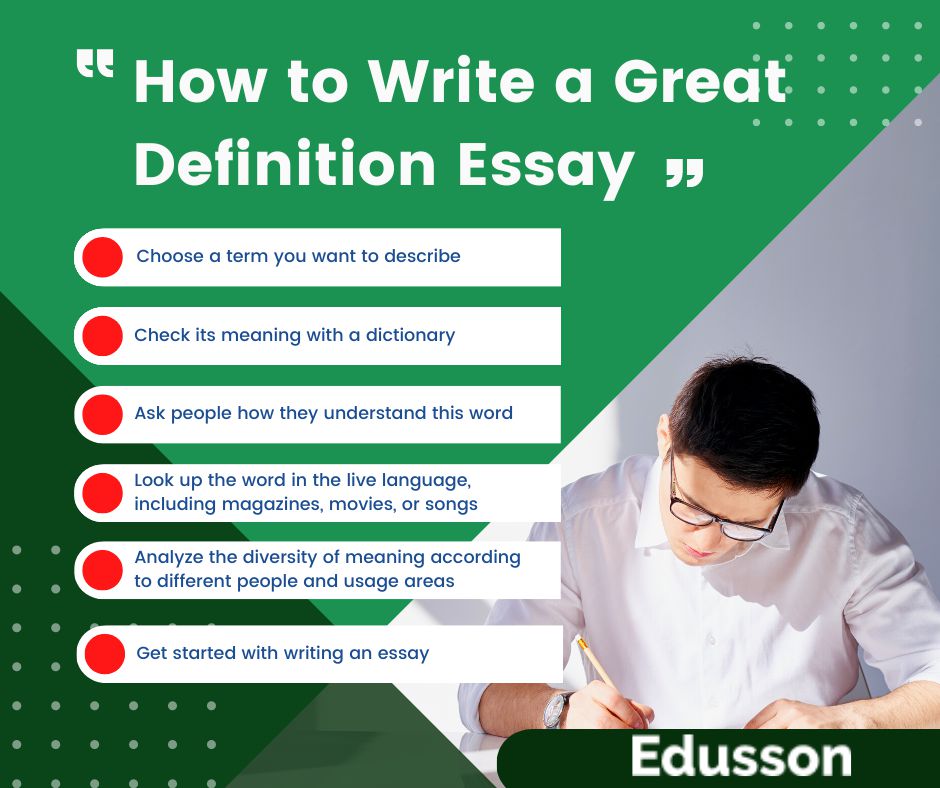
Pick a Word
Choosing a concept or idea is the main point in writing a definition essay. Choose a word that describes the concept or idea, for example, “Love”, “Hero”, “Truth”, “Hate”, etc. Make sure you completely understand the term you choose. Check with a dictionary, but do not copy the definition from it. Explain the term under discussion in your own words. If your concepts are fairly vague, you can seek out your own definition based on experience and then find sources to support your definitions.
Stay Away From Specific Things and Objects
Try not to choose such objects as “pillow”, “shelf”, or “cup” because it can make the writing even harder. Professional writers know this hint, as it’s just impossible to extend a definition and write a lot about specific objects. Besides, your essay will seem superficial and not shrewd enough.
Choose a Word That You Know
Pick a word that you are familiar with and picture it to yourself on a basic level. This way, it will be much easier to write. For instance, you can choose the word “honor” because you know what that means, you have something to say about it, you know how it feels, and you can apply it to your life.
Try to Pick a Word That Has More Than One Meaning
It would be better if you chose a word that has several meanings, especially if this word would mean different things to different people. In this case, you will have more to write about. You’ll be able to include your personal understanding as well as interpretations of other people. For instance, you can pick the word “love” since you know that there are a lot of different meanings to this word, and each person understands and experiences it in their own unique way.
Find the Word In the Dictionary
Every word has its formal meaning, which you can find in the dictionary. Get to know it. Take a closer look at the structure of the definition.
Study the Origin of the Word
Research the word in encyclopedias, find out where it came from, and study any theories and ideas about this word. Also, if you pick a word from the law field, for example, examine this word in law encyclopedias.
You can find a lot of information about words nowadays, all you need is an Internet connection. There are many resources where professional writers write essays for money . Such websites contain a lot of scholarly or academic works, blog posts, essays, and articles. They can also include a definition of your term. Moreover, there are many videos made by smart people who have already deeply researched many words and are now sharing their knowledge.
Ask Your Friends and Family About the Word
It is important to get your own perspective on the word. For that, you can talk to your friends and family and ask them something like “what this word means to you”, “what it is you first think about when you hear this word,” or “what you feel when you hear this word” and so on. Record all the answers and then use them as your sources.
Come up With Your Own Definition
Write down your definition of the word using the data from your research and experiences. For better clarification, you may want to use visuals. Explore the resources that can help with powerpoint presentation or stock up with relevant pictures that illustrate your concept.

Definition Essay Outline
The essay outline should briefly summarize the content of your essay. Definition essay structure organizes the text in an easy-to-understand and coherent manner. Writing a short draft is very effective, and some teachers even require students to submit drafts to make sure that they have written the essay themselves. Definition essay outline usually consists of a traditional intro, body paragraphs, and conclusion format. Here is a basic sample of how to do this:
Introduction
In the introduction, you demonstrate to your readers what this paper is going to be about. In the definition essay, the main goal of the introduction is to provide your readers with two definitions – “standard” one and thesis one. The standard definition is the one you find in a dictionary. The thesis definition is a bit different from the dictionary one, so it is important to give your readers a starting point in regards to the term in order to make everything clear.
Thesis Statement
The thesis statement in the definition essay is a combination of what this term actually means and your personal understanding. Do not write too much in this section, though. Save some info for the body paragraphs. Also, do not use phrases like “is where” and “is when” when describing the word. In general, try to stay away from passive phrases involving the word “is”.
Body Paragraphs
This is the largest part of your essay. Here you have to define the core parts of the term and put them into organized sections. Use the data from your research, such as the history of the word and its variations, and break it down into parts.
Traditionally, in the concluding section you have to sum up the main points of your reasoning but in different words. The ending of an academic definition essay should be interesting and deep. Show how this term impacts your life and finish by giving your reader a sense of purpose.

Finished papers
Customer reviews

Definition Essay Format
Formatting is often crucial for a successful text. If you’re not sure how to arrange it, it’s always a good idea to check tips on how to format an essay properly on special platforms with expert information.
- Attention-catcher
- Briefly tell about the term you are going to talk about
- Thesis statement
Body paragraphs
- Body Paragraph 1: History and Origin of the Word.
- Body Paragraph 2: Complete dictionary explanation and use of the Word.
- Body Paragraph 3: Personal definition created from your experience.
- Restate the thesis statement in different words
- Summarize the main key pieces of evidence
- Final closing sentence
Words to Use for a Definition Essay
When creating a definition essay, you should follow the general rules of writing an expository essay. The basic pieces like the introduction, body paragraphs, and conclusion are always the same across all essay types. The special pieces include key components which are peculiar to the definition essay. These are, for example, words that are most often used or are recommended in a definition essay.
Some good words for a definition essay comprise the following words and phrases:
- What … means
- Connotation
- Extended definition
These are the examples of words you will hardly avoid when preparing a definition essay. They are most often integral to the topic, but this does not mean you should use them all. You can, of course, arrange sentences and your ideas differently and with other means. The words above and the concepts they denote are core for definition essays. Moreover, when people search for a term definition, they may try to look for a relevant essay by the keywords. So these words may help them find your essay by these keywords and phrases. They are desired but not obligatory.
A really outstanding text should contain the right language also in other parts. The further words and phrases may be helpful and make your text sound academic:
“in other words”, “to put it another way”, “moreover”, “likewise”, “what’s more”, “as well as”, “not to mention”, “on the other hand”, “however”, “by contrast”, “in view of”, “nevertheless”, “to give an illustration”, “notably”, “above all”, “in conclusion”.
Definition Essay Topics
Good definition essay topics.
- What is Love?
- What is Wisdom?
- Define What Makes a “Good” Friend?
- Define Success
- Define “Beauty”
- Talk about Solitude
- What Smart Means to You?
- What does it mean to be a Good Person?
- What makes a Good Leadership?
- What Makes a Great Friend?
- What Scholar Means to You?
- What is Loneliness?

Definition Essay Examples
Sometimes people just cannot start writing their essay without looking at a complete example of somebody else, seeing the structure and how it is written. Yes, sometimes students need some extra inspiration to start their own work and that is fine. Thankfully, nowadays you can easily find many sample papers, moreover, here is one for you right now. Edusson is Ready to Help with Your Assignment Submit your requirements
Related posts:
- Narrative Essay: Useful Guidelines for Writing
- Research Paper Writing Help Guide
- How to Write a Critical Thinking Essay: Effective Tips
- How to Structure and Write an Effective Critique Paper
Improve your writing with our guides

How to Write a Scholarship Essay

Critical Essay: The Complete Guide. Essay Topics, Examples and Outlines

Seeing Beyond the Obvious: Tips for Writing a Strong Visual Analysis Essay
Get 15% off your first order with edusson.
Connect with a professional writer within minutes by placing your first order. No matter the subject, difficulty, academic level or document type, our writers have the skills to complete it.
100% privacy. No spam ever.

- Literary Terms
- Definition & Examples
- When & How to Write a Thesis
I. What is a Thesis?
The thesis (pronounced thee -seez), also known as a thesis statement, is the sentence that introduces the main argument or point of view of a composition (formal essay, nonfiction piece, or narrative). It is the main claim that the author is making about that topic and serves to summarize and introduce that writing that will be discussed throughout the entire piece. For this reason, the thesis is typically found within the first introduction paragraph.
II. Examples of Theses
Here are a few examples of theses which may be found in the introductions of a variety of essays :
In “The Mending Wall,” Robert Frost uses imagery, metaphor, and dialogue to argue against the use of fences between neighbors.
In this example, the thesis introduces the main subject (Frost’s poem “The Mending Wall”), aspects of the subject which will be examined (imagery, metaphor, and dialogue) and the writer’s argument (fences should not be used).
While Facebook connects some, overall, the social networking site is negative in that it isolates users, causes jealousy, and becomes an addiction.
This thesis introduces an argumentative essay which argues against the use of Facebook due to three of its negative effects.
During the college application process, I discovered my willingness to work hard to achieve my dreams and just what those dreams were.
In this more personal example, the thesis statement introduces a narrative essay which will focus on personal development in realizing one’s goals and how to achieve them.
III. The Importance of Using a Thesis
Theses are absolutely necessary components in essays because they introduce what an essay will be about. Without a thesis, the essay lacks clear organization and direction. Theses allow writers to organize their ideas by clearly stating them, and they allow readers to be aware from the beginning of a composition’s subject, argument, and course. Thesis statements must precisely express an argument within the introductory paragraph of the piece in order to guide the reader from the very beginning.
IV. Examples of Theses in Literature
For examples of theses in literature, consider these thesis statements from essays about topics in literature:
In William Shakespeare’s “ Sonnet 46,” both physicality and emotion together form powerful romantic love.
This thesis statement clearly states the work and its author as well as the main argument: physicality and emotion create romantic love.
In The Scarlet Letter, Nathaniel Hawthorne symbolically shows Hester Prynne’s developing identity through the use of the letter A: she moves from adulteress to able community member to angel.
In this example, the work and author are introduced as well as the main argument and supporting points: Prynne’s identity is shown through the letter A in three ways: adulteress, able community member, and angel.
John Keats’ poem “To Autumn” utilizes rhythm, rhyme, and imagery to examine autumn’s simultaneous birth and decay.
This thesis statement introduces the poem and its author along with an argument about the nature of autumn. This argument will be supported by an examination of rhythm, rhyme, and imagery.
V. Examples of Theses in Pop Culture
Sometimes, pop culture attempts to make arguments similar to those of research papers and essays. Here are a few examples of theses in pop culture:

America’s food industry is making a killing and it’s making us sick, but you have the power to turn the tables.
The documentary Food Inc. examines this thesis with evidence throughout the film including video evidence, interviews with experts, and scientific research.

Orca whales should not be kept in captivity, as it is psychologically traumatizing and has caused them to kill their own trainers.
Blackfish uses footage, interviews, and history to argue for the thesis that orca whales should not be held in captivity.
VI. Related Terms
Just as a thesis is introduced in the beginning of a composition, the hypothesis is considered a starting point as well. Whereas a thesis introduces the main point of an essay, the hypothesis introduces a proposed explanation which is being investigated through scientific or mathematical research. Thesis statements present arguments based on evidence which is presented throughout the paper, whereas hypotheses are being tested by scientists and mathematicians who may disprove or prove them through experimentation. Here is an example of a hypothesis versus a thesis:
Hypothesis:
Students skip school more often as summer vacation approaches.
This hypothesis could be tested by examining attendance records and interviewing students. It may or may not be true.
Students skip school due to sickness, boredom with classes, and the urge to rebel.
This thesis presents an argument which will be examined and supported in the paper with detailed evidence and research.
Introduction
A paper’s introduction is its first paragraph which is used to introduce the paper’s main aim and points used to support that aim throughout the paper. The thesis statement is the most important part of the introduction which states all of this information in one concise statement. Typically, introduction paragraphs require a thesis statement which ties together the entire introduction and introduces the rest of the paper.
VII. Conclusion
Theses are necessary components of well-organized and convincing essays, nonfiction pieces, narratives , and documentaries. They allow writers to organize and support arguments to be developed throughout a composition, and they allow readers to understand from the beginning what the aim of the composition is.
List of Terms
- Alliteration
- Amplification
- Anachronism
- Anthropomorphism
- Antonomasia
- APA Citation
- Aposiopesis
- Autobiography
- Bildungsroman
- Characterization
- Circumlocution
- Cliffhanger
- Comic Relief
- Connotation
- Deus ex machina
- Deuteragonist
- Doppelganger
- Double Entendre
- Dramatic irony
- Equivocation
- Extended Metaphor
- Figures of Speech
- Flash-forward
- Foreshadowing
- Intertextuality
- Juxtaposition
- Literary Device
- Malapropism
- Onomatopoeia
- Parallelism
- Pathetic Fallacy
- Personification
- Point of View
- Polysyndeton
- Protagonist
- Red Herring
- Rhetorical Device
- Rhetorical Question
- Science Fiction
- Self-Fulfilling Prophecy
- Synesthesia
- Turning Point
- Understatement
- Urban Legend
- Verisimilitude
- Essay Guide
- Cite This Website
25 Thesis Statement Examples

A thesis statement is needed in an essay or dissertation . There are multiple types of thesis statements – but generally we can divide them into expository and argumentative. An expository statement is a statement of fact (common in expository essays and process essays) while an argumentative statement is a statement of opinion (common in argumentative essays and dissertations). Below are examples of each.
Strong Thesis Statement Examples

1. School Uniforms
“Mandatory school uniforms should be implemented in educational institutions as they promote a sense of equality, reduce distractions, and foster a focused and professional learning environment.”
Best For: Argumentative Essay or Debate
Read More: School Uniforms Pros and Cons

2. Nature vs Nurture
“This essay will explore how both genetic inheritance and environmental factors equally contribute to shaping human behavior and personality.”
Best For: Compare and Contrast Essay
Read More: Nature vs Nurture Debate

3. American Dream
“The American Dream, a symbol of opportunity and success, is increasingly elusive in today’s socio-economic landscape, revealing deeper inequalities in society.”
Best For: Persuasive Essay
Read More: What is the American Dream?

4. Social Media
“Social media has revolutionized communication and societal interactions, but it also presents significant challenges related to privacy, mental health, and misinformation.”
Best For: Expository Essay
Read More: The Pros and Cons of Social Media

5. Globalization
“Globalization has created a world more interconnected than ever before, yet it also amplifies economic disparities and cultural homogenization.”
Read More: Globalization Pros and Cons

6. Urbanization
“Urbanization drives economic growth and social development, but it also poses unique challenges in sustainability and quality of life.”
Read More: Learn about Urbanization

7. Immigration
“Immigration enriches receiving countries culturally and economically, outweighing any perceived social or economic burdens.”
Read More: Immigration Pros and Cons

8. Cultural Identity
“In a globalized world, maintaining distinct cultural identities is crucial for preserving cultural diversity and fostering global understanding, despite the challenges of assimilation and homogenization.”
Best For: Argumentative Essay
Read More: Learn about Cultural Identity

9. Technology
“Medical technologies in care institutions in Toronto has increased subjcetive outcomes for patients with chronic pain.”
Best For: Research Paper

10. Capitalism vs Socialism
“The debate between capitalism and socialism centers on balancing economic freedom and inequality, each presenting distinct approaches to resource distribution and social welfare.”

11. Cultural Heritage
“The preservation of cultural heritage is essential, not only for cultural identity but also for educating future generations, outweighing the arguments for modernization and commercialization.”

12. Pseudoscience
“Pseudoscience, characterized by a lack of empirical support, continues to influence public perception and decision-making, often at the expense of scientific credibility.”
Read More: Examples of Pseudoscience

13. Free Will
“The concept of free will is largely an illusion, with human behavior and decisions predominantly determined by biological and environmental factors.”
Read More: Do we have Free Will?

14. Gender Roles
“Traditional gender roles are outdated and harmful, restricting individual freedoms and perpetuating gender inequalities in modern society.”
Read More: What are Traditional Gender Roles?

15. Work-Life Ballance
“The trend to online and distance work in the 2020s led to improved subjective feelings of work-life balance but simultaneously increased self-reported loneliness.”
Read More: Work-Life Balance Examples

16. Universal Healthcare
“Universal healthcare is a fundamental human right and the most effective system for ensuring health equity and societal well-being, outweighing concerns about government involvement and costs.”
Read More: The Pros and Cons of Universal Healthcare

17. Minimum Wage
“The implementation of a fair minimum wage is vital for reducing economic inequality, yet it is often contentious due to its potential impact on businesses and employment rates.”
Read More: The Pros and Cons of Raising the Minimum Wage

18. Homework
“The homework provided throughout this semester has enabled me to achieve greater self-reflection, identify gaps in my knowledge, and reinforce those gaps through spaced repetition.”
Best For: Reflective Essay
Read More: Reasons Homework Should be Banned

19. Charter Schools
“Charter schools offer alternatives to traditional public education, promising innovation and choice but also raising questions about accountability and educational equity.”
Read More: The Pros and Cons of Charter Schools

20. Effects of the Internet
“The Internet has drastically reshaped human communication, access to information, and societal dynamics, generally with a net positive effect on society.”
Read More: The Pros and Cons of the Internet

21. Affirmative Action
“Affirmative action is essential for rectifying historical injustices and achieving true meritocracy in education and employment, contrary to claims of reverse discrimination.”
Best For: Essay
Read More: Affirmative Action Pros and Cons

22. Soft Skills
“Soft skills, such as communication and empathy, are increasingly recognized as essential for success in the modern workforce, and therefore should be a strong focus at school and university level.”
Read More: Soft Skills Examples

23. Moral Panic
“Moral panic, often fueled by media and cultural anxieties, can lead to exaggerated societal responses that sometimes overlook rational analysis and evidence.”
Read More: Moral Panic Examples

24. Freedom of the Press
“Freedom of the press is critical for democracy and informed citizenship, yet it faces challenges from censorship, media bias, and the proliferation of misinformation.”
Read More: Freedom of the Press Examples

25. Mass Media
“Mass media shapes public opinion and cultural norms, but its concentration of ownership and commercial interests raise concerns about bias and the quality of information.”
Best For: Critical Analysis
Read More: Mass Media Examples
Checklist: How to use your Thesis Statement
✅ Position: If your statement is for an argumentative or persuasive essay, or a dissertation, ensure it takes a clear stance on the topic. ✅ Specificity: It addresses a specific aspect of the topic, providing focus for the essay. ✅ Conciseness: Typically, a thesis statement is one to two sentences long. It should be concise, clear, and easily identifiable. ✅ Direction: The thesis statement guides the direction of the essay, providing a roadmap for the argument, narrative, or explanation. ✅ Evidence-based: While the thesis statement itself doesn’t include evidence, it sets up an argument that can be supported with evidence in the body of the essay. ✅ Placement: Generally, the thesis statement is placed at the end of the introduction of an essay.
Try These AI Prompts – Thesis Statement Generator!
One way to brainstorm thesis statements is to get AI to brainstorm some for you! Try this AI prompt:
💡 AI PROMPT FOR EXPOSITORY THESIS STATEMENT I am writing an essay on [TOPIC] and these are the instructions my teacher gave me: [INSTUCTIONS]. I want you to create an expository thesis statement that doesn’t argue a position, but demonstrates depth of knowledge about the topic.
💡 AI PROMPT FOR ARGUMENTATIVE THESIS STATEMENT I am writing an essay on [TOPIC] and these are the instructions my teacher gave me: [INSTRUCTIONS]. I want you to create an argumentative thesis statement that clearly takes a position on this issue.
💡 AI PROMPT FOR COMPARE AND CONTRAST THESIS STATEMENT I am writing a compare and contrast essay that compares [Concept 1] and [Concept2]. Give me 5 potential single-sentence thesis statements that remain objective.

Chris Drew (PhD)
Dr. Chris Drew is the founder of the Helpful Professor. He holds a PhD in education and has published over 20 articles in scholarly journals. He is the former editor of the Journal of Learning Development in Higher Education. [Image Descriptor: Photo of Chris]
- Chris Drew (PhD) https://helpfulprofessor.com/author/chris-drew-phd/ Forest Schools Philosophy & Curriculum, Explained!
- Chris Drew (PhD) https://helpfulprofessor.com/author/chris-drew-phd/ Montessori's 4 Planes of Development, Explained!
- Chris Drew (PhD) https://helpfulprofessor.com/author/chris-drew-phd/ Montessori vs Reggio Emilia vs Steiner-Waldorf vs Froebel
- Chris Drew (PhD) https://helpfulprofessor.com/author/chris-drew-phd/ Parten’s 6 Stages of Play in Childhood, Explained!
Leave a Comment Cancel Reply
Your email address will not be published. Required fields are marked *
Module 8: Analysis and Synthesis
Analytical thesis statements, learning objective.
- Describe strategies for writing analytical thesis statements
- Identify analytical thesis statements
In order to write an analysis, you want to first have a solid understanding of the thing you are analyzing. Remember, when you are analyzing as a writer, you are:
- Breaking down information or artifacts into component parts
- Uncovering relationships among those parts
- Determining motives, causes, and underlying assumptions
- Making inferences and finding evidence to support generalizations
You may be asked to analyze a book, an essay, a poem, a movie, or even a song. For example, let’s suppose you want to analyze the lyrics to a popular song. Pretend that a rapper called Escalade has the biggest hit of the summer with a song titled “Missing You.” You listen to the song and determine that it is about the pain people feel when a loved one dies. You have already done analysis at a surface level and you want to begin writing your analysis. You start with the following thesis statement:
Escalade’s hit song “Missing You” is about grieving after a loved one dies.
There isn’t much depth or complexity to such a claim because the thesis doesn’t give much information. In order to write a better thesis statement, we need to dig deeper into the song. What is the importance of the lyrics? What are they really about? Why is the song about grieving? Why did he present it this way? Why is it a powerful song? Ask questions to lead you to further investigation. Doing so will help you better understand the work, but also help you develop a better thesis statement and stronger analytical essay.
Formulating an Analytical Thesis Statement
When formulating an analytical thesis statement in college, here are some helpful words and phrases to remember:
- What? What is the claim?
- How? How is this claim supported?
- So what? In other words, “What does this mean, what are the implications, or why is this important?”
Telling readers what the lyrics are might be a useful way to let them see what you are analyzing and/or to isolate specific parts where you are focusing your analysis. However, you need to move far beyond “what.” Instructors at the college level want to see your ability to break down material and demonstrate deep thinking. The claim in the thesis statement above said that Escalade’s song was about loss, but what evidence do we have for that, and why does that matter?
Effective analytical thesis statements require digging deeper and perhaps examining the larger context. Let’s say you do some research and learn that the rapper’s mother died not long ago, and when you examine the lyrics more closely, you see that a few of the lines seem to be specifically about a mother rather than a loved one in general.
Then you also read a recent interview with Escalade in which he mentions that he’s staying away from hardcore rap lyrics on his new album in an effort to be more mainstream and reach more potential fans. Finally, you notice that some of the lyrics in the song focus on not taking full advantage of the time we have with our loved ones. All of these pieces give you material to write a more complex thesis statement, maybe something like this:
In the hit song “Missing You,” Escalade draws on his experience of losing his mother and raps about the importance of not taking time with family for granted in order to connect with his audience.
Such a thesis statement is focused while still allowing plenty of room for support in the body of your paper. It addresses the questions posed above:
- The claim is that Escalade connects with a broader audience by rapping about the importance of not taking time with family for granted in his hit song, “Missing You.”
- This claim is supported in the lyrics of the song and through the “experience of losing his mother.”
- The implications are that we should not take the time we have with people for granted.
Certainly, there may be many ways for you to address “what,” “how,” and “so what,” and you may want to explore other ideas, but the above example is just one way to more fully analyze the material. Note that the example above is not formulaic, but if you need help getting started, you could use this template format to help develop your thesis statement.
Through ________________(how?), we can see that __________________(what?), which is important because ___________________(so what?). [1]
Just remember to think about these questions (what? how? and so what?) as you try to determine why something is what it is or why something means what it means. Asking these questions can help you analyze a song, story, or work of art, and can also help you construct meaningful thesis sentences when you write an analytical paper.
Key Takeaways for analytical theses
Don’t be afraid to let your claim evolve organically . If you find that your thinking and writing don’t stick exactly to the thesis statement you have constructed, your options are to scrap the writing and start again to make it fit your claim (which might not always be possible) or to modify your thesis statement. The latter option can be much easier if you are okay with the changes. As with many projects in life, writing doesn’t always go in the direction we plan, and strong analysis may mean thinking about and making changes as you look more closely at your topic. Be flexible.
Use analysis to get you to the main claim. You may have heard the simile that analysis is like peeling an onion because you have to go through layers to complete your work. You can start the process of breaking down an idea or an artifact without knowing where it will lead you or without a main claim or idea to guide you. Often, careful assessment of the pieces will bring you to an interesting interpretation of the whole. In their text Writing Analytically , authors David Rosenwasser and Jill Stephen posit that being analytical doesn’t mean just breaking something down. It also means constructing understandings. Don’t assume you need to have deeper interpretations all figured out as you start your work.
When you decide upon the main claim, make sure it is reasoned . In other words, if it is very unlikely anyone else would reach the same interpretation you are making, it might be off base. Not everyone needs to see an idea the same way you do, but a reasonable person should be able to understand, if not agree, with your analysis.
Look for analytical thesis statements in the following activity.
Using Evidence
An effective analytical thesis statement (or claim) may sound smart or slick, but it requires evidence to be fully realized. Consider movie trailers and the actual full-length movies they advertise as an analogy. If you see an exciting one-minute movie trailer online and then go see the film only to leave disappointed because all the good parts were in the trailer, you feel cheated, right? You think you were promised something that didn’t deliver in its execution. A paper with a strong thesis statement but lackluster evidence feels the same way to readers.
So what does strong analytical evidence look like? Think again about “what,” “how,” and “so what.” A claim introduces these interpretations, and evidence lets you show them. Keep in mind that evidence used in writing analytically will build on itself as the piece progresses, much like a good movie builds to an interesting climax.
Key Takeaways about evidence
Be selective about evidence. Having a narrow thesis statement will help you be selective with evidence, but even then, you don’t need to include any and every piece of information related to your main claim. Consider the best points to back up your analytic thesis statement and go deeply into them. (Also, remember that you may modify your thesis statement as you think and write, so being selective about what evidence you use in an analysis may actually help you narrow down what was a broad main claim as you work.) Refer back to our movie theme in this section: You have probably seen plenty of films that would have been better with some parts cut out and more attention paid to intriguing but underdeveloped characters and/or ideas.
Be clear and explicit with your evidence. Don’t assume that readers know exactly what you are thinking. Make your points and explain them in detail, providing information and context for readers, where necessary. Remember that analysis is critical examination and interpretation, but you can’t just assume that others always share or intuit your line of thinking. Need a movie analogy? Think back on all the times you or someone you know has said something like “I’m not sure what is going on in this movie.”
Move past obvious interpretations. Analyzing requires brainpower. Writing analytically is even more difficult. Don’t, however, try to take the easy way out by using obvious evidence (or working from an obvious claim). Many times writers have a couple of great pieces of evidence to support an interesting interpretation, but they feel the need to tack on an obvious idea—often more of an observation than analysis—somewhere in their work. This tendency may stem from the conventions of the five-paragraph essay, which features three points of support. Writing analytically, though, does not mean writing a five-paragraph essay (not much writing in college does). Develop your other evidence further or modify your main idea to allow room for additional strong evidence, but avoid obvious observations as support for your main claim. One last movie comparison? Go take a look at some of the debate on predictable Hollywood scripts. Have you ever watched a movie and felt like you have seen it before? You have, in one way or another. A sharp reader will be about as interested in obvious evidence as he or she will be in seeing a tired script reworked for the thousandth time.
One type of analysis you may be asked to write is a literary analysis, in which you examine a piece of text by breaking it down and looking for common literary elements, such as character, symbolism, plot, setting, imagery, and tone.
The video below compares writing a literary analysis to analyzing a team’s chances of winning a game—just as you would look at various factors like the weather, coaching, players, their record, and their motivation for playing. Similarly, when analyzing a literary text you want to look at all of the literary elements that contribute to the work.
The video takes you through the story of Cinderalla as an example, following the simplest possible angle (or thesis statement), that “Dreams can come true if you don’t give up.” (Note that if you were really asked to analyze Cinderella for a college class, you would want to dig deeper to find a more nuanced and interesting theme, but it works well for this example.) To analyze the story with this theme in mind, you’d want to consider the literary elements such as imagery, characters, dialogue, symbolism, the setting, plot, and tone, and consider how each of these contribute to the message that “Dreams can come true if you don’t give up.”
You can view the transcript for “How to Analyze Literature” here (opens in new window) .
- UCLA Undergraduate Writing Center. "What, How and So What?" Approaching the Thesis as a Process. https://wp.ucla.edu/wp-content/uploads/2016/01/UWC_handouts_What-How-So-What-Thesis-revised-5-4-15-RZ.pdf ↵
- Keys to Successful Analysis. Authored by : Guy Krueger. Provided by : University of Mississippi. License : CC BY-SA: Attribution-ShareAlike
- Thesis Statement Activity. Authored by : Excelsior OWL. Located at : https://owl.excelsior.edu/research/thesis-or-focus/thesis-or-focus-thesis-statement-activity/ . License : CC BY: Attribution
- What is Analysis?. Authored by : Karen Forgette. Provided by : University of Mississippi. License : CC BY: Attribution
- How to Analyze Literature. Provided by : HACC, Central Pennsylvania's Community College. Located at : https://www.youtube.com/watch?v=pr4BjZkQ5Nc . License : Other . License Terms : Standard YouTube License

This IP Address is Blocked
Purdue Online Writing Lab Purdue OWL® College of Liberal Arts
Tips and Examples for Writing Thesis Statements

Welcome to the Purdue OWL
This page is brought to you by the OWL at Purdue University. When printing this page, you must include the entire legal notice.
Copyright ©1995-2018 by The Writing Lab & The OWL at Purdue and Purdue University. All rights reserved. This material may not be published, reproduced, broadcast, rewritten, or redistributed without permission. Use of this site constitutes acceptance of our terms and conditions of fair use.
Tips for Writing Your Thesis Statement
1. Determine what kind of paper you are writing:
- An analytical paper breaks down an issue or an idea into its component parts, evaluates the issue or idea, and presents this breakdown and evaluation to the audience.
- An expository (explanatory) paper explains something to the audience.
- An argumentative paper makes a claim about a topic and justifies this claim with specific evidence. The claim could be an opinion, a policy proposal, an evaluation, a cause-and-effect statement, or an interpretation. The goal of the argumentative paper is to convince the audience that the claim is true based on the evidence provided.
If you are writing a text that does not fall under these three categories (e.g., a narrative), a thesis statement somewhere in the first paragraph could still be helpful to your reader.
2. Your thesis statement should be specific—it should cover only what you will discuss in your paper and should be supported with specific evidence.
3. The thesis statement usually appears at the end of the first paragraph of a paper.
4. Your topic may change as you write, so you may need to revise your thesis statement to reflect exactly what you have discussed in the paper.
Thesis Statement Examples
Example of an analytical thesis statement:
The paper that follows should:
- Explain the analysis of the college admission process
- Explain the challenge facing admissions counselors
Example of an expository (explanatory) thesis statement:
- Explain how students spend their time studying, attending class, and socializing with peers
Example of an argumentative thesis statement:
- Present an argument and give evidence to support the claim that students should pursue community projects before entering college
Understanding Permissive Parenting: Definition and Impact on Child Development
This essay about permissive parenting examines its definition and impact on child development. Permissive parents are loving but provide few rules, leading to potential issues like lack of discipline and self-control in children. The essay discusses the balance needed between warmth and structure to ensure positive outcomes such as strong parent-child bonds and the development of creativity and problem-solving skills while mitigating negative effects like aggression and dependency.
How it works
Cite this page
Understanding Permissive Parenting: Definition and Impact on Child Development. (2024, May 28). Retrieved from https://papersowl.com/examples/understanding-permissive-parenting-definition-and-impact-on-child-development/
"Understanding Permissive Parenting: Definition and Impact on Child Development." PapersOwl.com , 28 May 2024, https://papersowl.com/examples/understanding-permissive-parenting-definition-and-impact-on-child-development/
PapersOwl.com. (2024). Understanding Permissive Parenting: Definition and Impact on Child Development . [Online]. Available at: https://papersowl.com/examples/understanding-permissive-parenting-definition-and-impact-on-child-development/ [Accessed: 1 Jun. 2024]
"Understanding Permissive Parenting: Definition and Impact on Child Development." PapersOwl.com, May 28, 2024. Accessed June 1, 2024. https://papersowl.com/examples/understanding-permissive-parenting-definition-and-impact-on-child-development/
"Understanding Permissive Parenting: Definition and Impact on Child Development," PapersOwl.com , 28-May-2024. [Online]. Available: https://papersowl.com/examples/understanding-permissive-parenting-definition-and-impact-on-child-development/. [Accessed: 1-Jun-2024]
PapersOwl.com. (2024). Understanding Permissive Parenting: Definition and Impact on Child Development . [Online]. Available at: https://papersowl.com/examples/understanding-permissive-parenting-definition-and-impact-on-child-development/ [Accessed: 1-Jun-2024]
Don't let plagiarism ruin your grade
Hire a writer to get a unique paper crafted to your needs.

Our writers will help you fix any mistakes and get an A+!
Please check your inbox.
You can order an original essay written according to your instructions.
Trusted by over 1 million students worldwide
1. Tell Us Your Requirements
2. Pick your perfect writer
3. Get Your Paper and Pay
Hi! I'm Amy, your personal assistant!
Don't know where to start? Give me your paper requirements and I connect you to an academic expert.
short deadlines
100% Plagiarism-Free
Certified writers

Reflective Essay
Reflective essay generator.

Sometimes, it is our experiences that startled and challenged our own voyage that strengthens and improves us to be the best versions of ourselves. If your life experience greatly moved you, there is a certain essay that allows you to compose your own endeavor. In this article, read through because we will be discussing the fundamentals of writing a reflective essay.
They say that being wise is better than being knowledgeable. Wisdom is acquired through reflection of one’s experience as well as of the environment. The more we reflect the more we become aware of ourselves. We become mindful of our existence as well as the meaning of life and all the things that surround us. Here we present different formats of essays like essays in doc .
Reflective Essay Outline Template
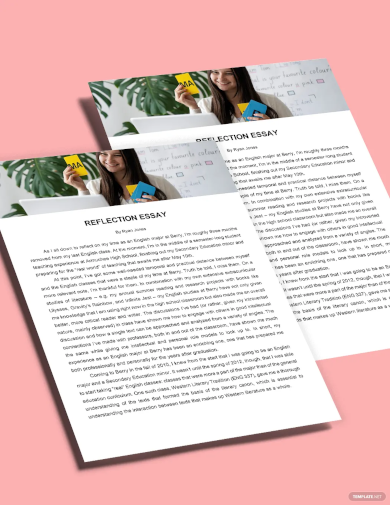
- Google Docs
Size: 188 KB
Reflective Essay About Life Experience
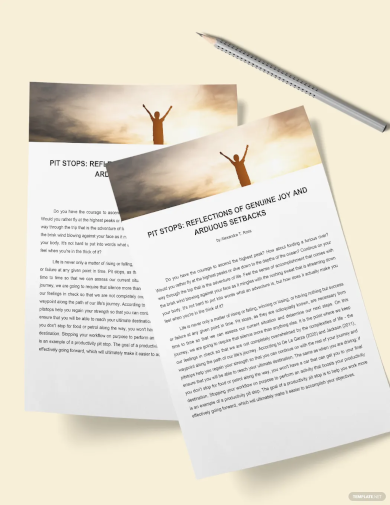
- Apple Pages
Size: 142 KB
Reflective Essay Template

Size: 237 KB
Self Reflective Essay Template
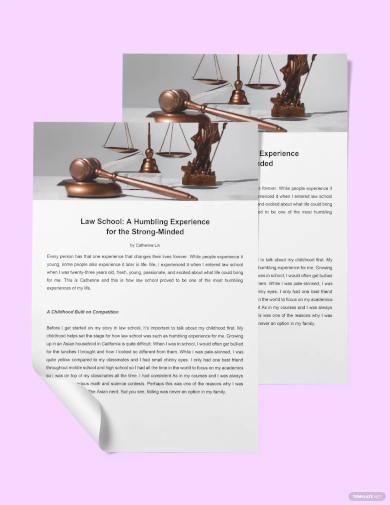
Size: 114 KB
Personal Reflective Essay Template
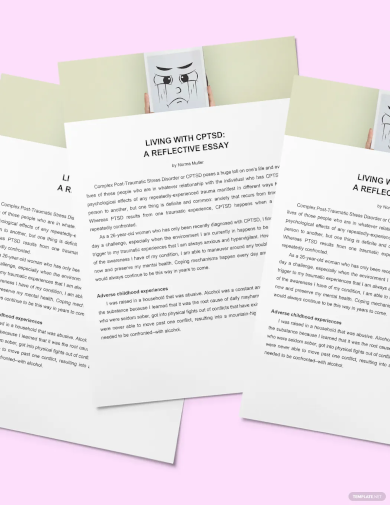
Size: 126 KB
Personal Reflective Sample
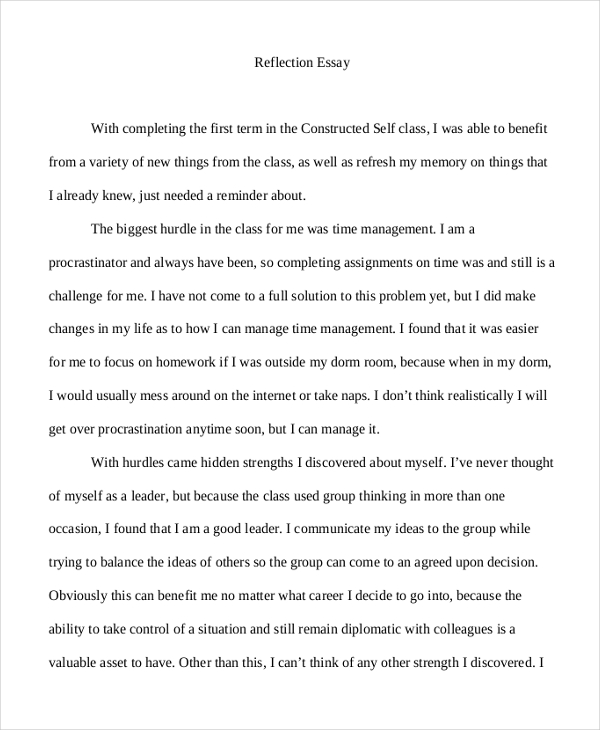
High School Essay
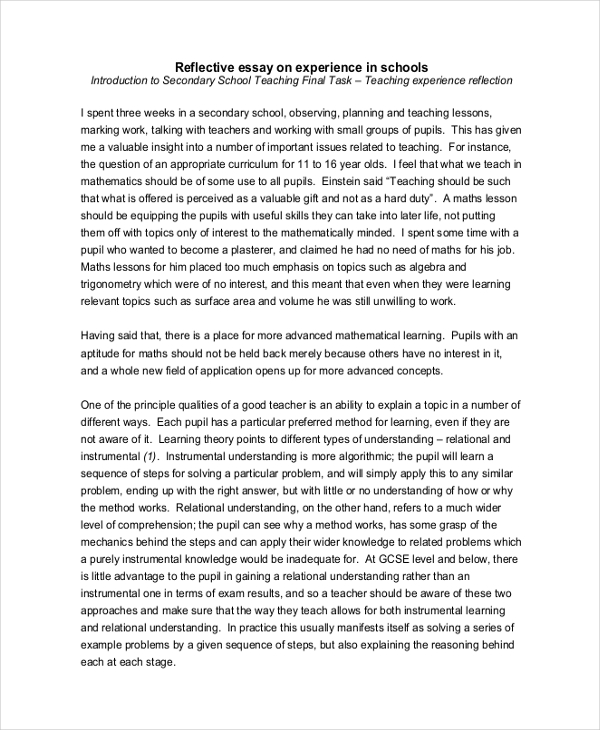
- PDFReflective Essay Example Reflective Essay Example Reflective Essay Example
Size: 102 KB
Reflective Essay Outline
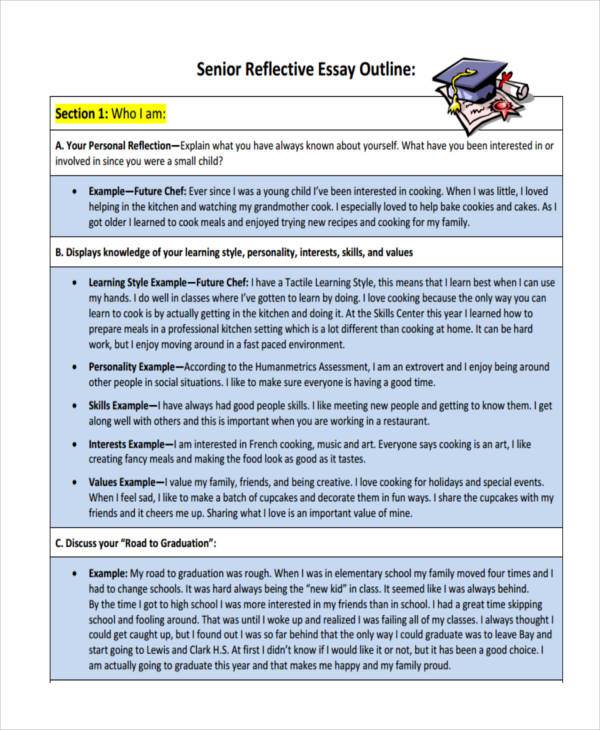
Size: 247 KB
Student Reflective Example
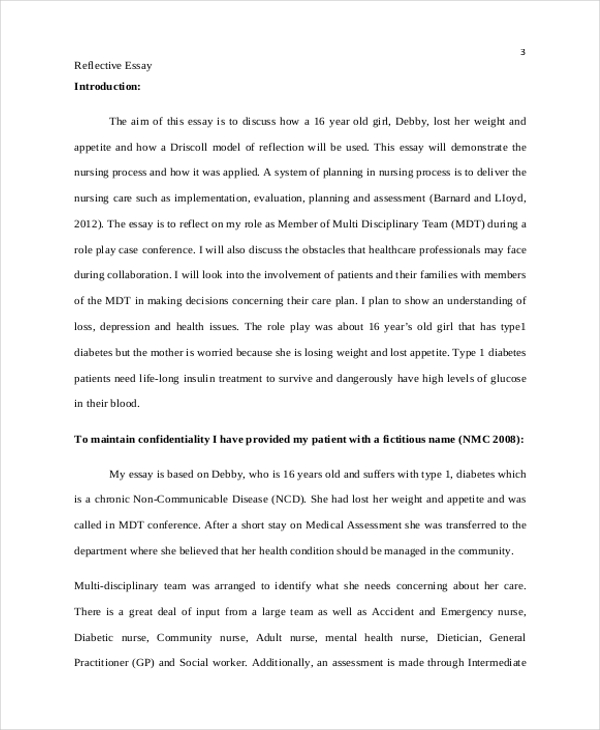
Size: 42 KB
Communication Reflective
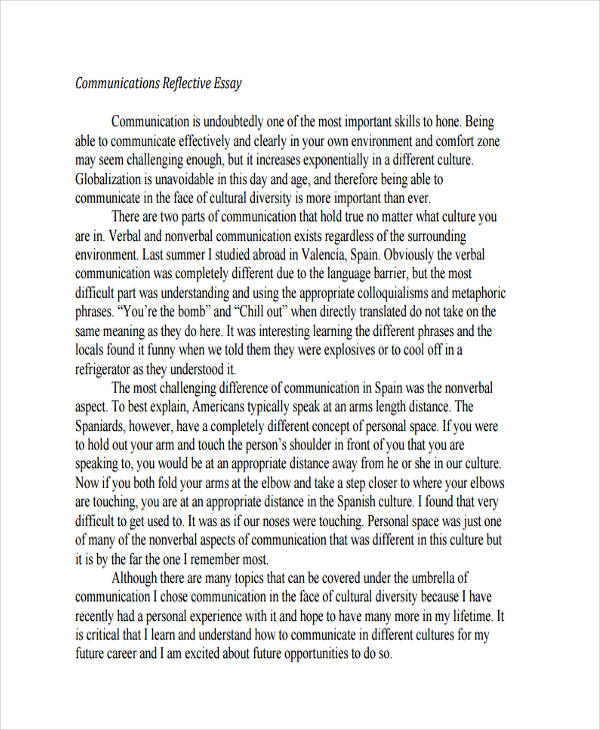
Size: 66 KB
What Is a Reflective Essay?
A reflective essay is a written piece of literature that focuses on presenting and narrating a person’s experience and how it becomes an instrument towards a change of perception in life.
It is a way for a writer to share an important event in his/her life and how it affected him/her so that others may learn something from it. Reflective writing root on life-changing events. The writer shares a specific experience, provides a narration of the incident including the material elements. It offers a realization so that others who may have had the same experience can draw out a shared mutual lesson from it.
How to Write a Reflective Essay
To write a reflective short essay , you need to have the right disposition as well as the momentum. Remember that you are not just writing to say something but to share an important lesson in life.
1. Think of an important event. What you will be writing on your reflective essay is something that is rooted in your own personal experience or encounter of something. Think deep and concentrate. You may also see personal essay examples & samples.
2. Introduce your topic. In your introduction, write the concrete event or experience that you want to share. Pattern it in a story form.
3. Develop your point. Write the main content of your essay with at least three to five paragraphs supporting your main topic.
Final Reflective Essay
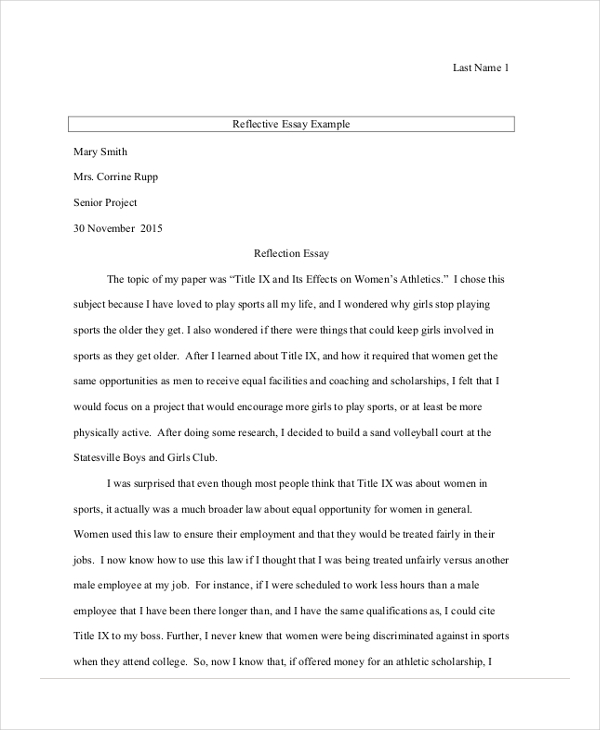
Size: 49 KB
Internship Reflective Essay
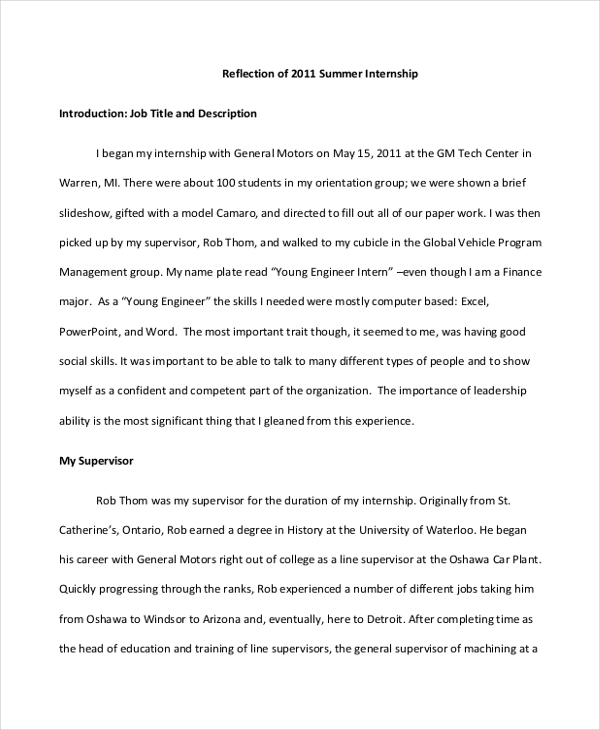
Size: 285 KB
Leadership Reflective Example
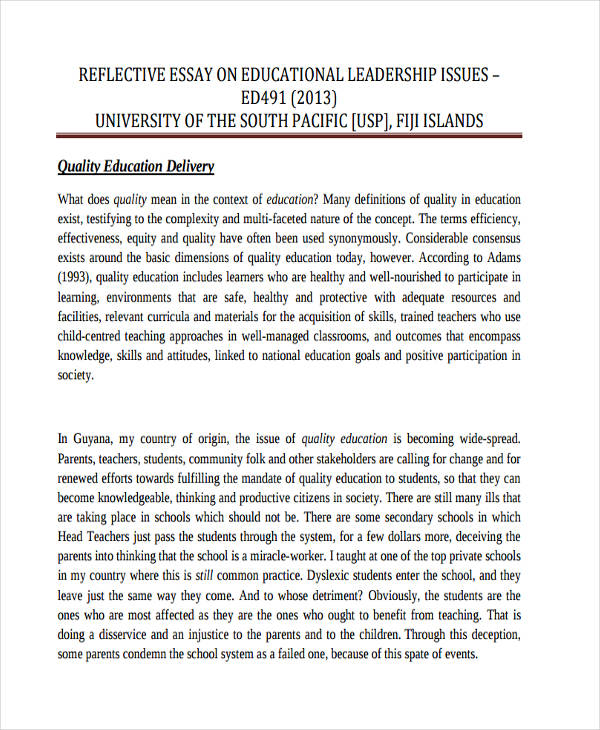
Size: 634 KB
Nursing Reflective Essay
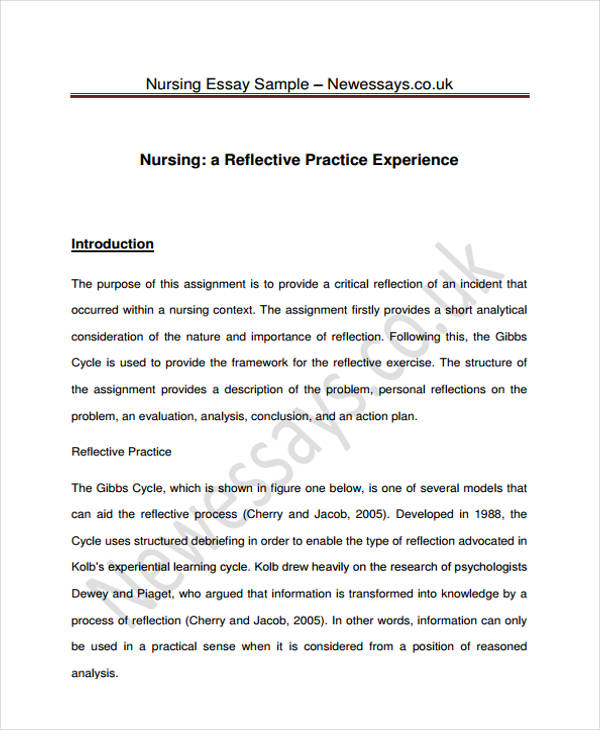
Size: 331 KB
Research Reflective Example
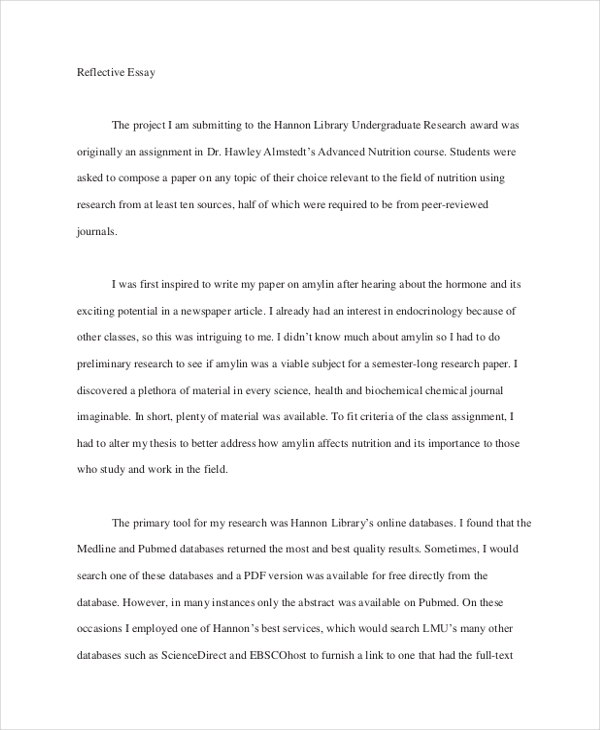
Size: 155 KB
Tips on Writing a Reflective Essay
Writing a reflective essay is not persuasive writing where you have to convince your readers to accept your opinion. You simply have to share an experience.
1. Write a draft. Do not jump hastily onto formal writing . Write a draft where you can create a bulleted list of the things that you want to share.
2. Think logically. When presenting a story, do it in a chronological manner so that your readers can understand the plot. Do this as well when presenting your ideas.
3. Create a summary. Use a summary writing to briefly state your insights and to give your final thoughts of the topic.
Importance of a Reflective Essay
In this era that we currently live in, personal reflection can be considered a thing of the past. Because of the gradual change and development of the things around us, we find it difficult to pause and reflect on the things that happen to our lives. You may also see academic essay examples .
The importance of writing an essay is to present to us the things that we rarely encounter in our day-to-day activities. In this time when material things are all that mattered, we have become unappreciative of the abstract things like love, compassion, and mercy. We cannot learn these things from those electronic gadgets that keep us busy.
How to Start a Reflective Essay Correctly
As mentioned above, a reflective essay presents and narrates the experience of a writer and how it changes the way he/she perceives life. In a simpler sense, it talks about how the author reflected on a certain adventure. As an essayist, since it’s you who bears the story and lessons, you are the one who is responsible for expressing it.
Just like any other composition, it’s your introduction that catches the attention of the reader. Thus, in order for your essay to be fully read, it is important to start your essay remarkably. If you find writing an introduction for your reflective essay challenging, don’t worry, you’re not alone. In this section, we are going to slowly tackle the ways to compose a compelling introduction.
1. Being catchy is the key.
In writing your reflective essay, you must start with something that would captivate the readers right away. Since the purpose of the introduction is to grab some attention, you may include some unique and interesting facts or beliefs. In this part, showcase your creativity by adding an introduction that is written in a bizarre manner and not those that depict cliché experience. You may also utilize a highly moving quotation or a dialogue that would also be appropriate for your reader.
2. Write the thesis statement in one sentence.
A thesis statement refers to the sentence that carries the topic being discussed in the whole essay. Therefore, it bears the central idea in which your essay revolves around. In writing your own essay, construct this statement in a clear and concise sentence. In this way, the reader will have a better grasp of your topic and would be clearly oriented on what you want to convey. In most cases, thesis statements are written at the end of the introduction.
3. Stick to the first person POV.
Remembering that this essay is subjective and depends on the author’s interpretation, it is important to use the first person point of view. By using this POV, it would be easier for you to convey your thoughts and opinions, and it would engage you to the readers like you’re telling a story in person. The first person involves the pronouns I , me , my , and mine .
4. Keep it brief.
When it comes to writing your own essay, you must perceive what your readers feel or see in reading your composition. Always put into mind that readers also have their own time to spend, and without a mark in the writing industry, people won’t invest much time on reading your essay. Thus, it is important to keep your composition concise. You can utilize a paragraph of five to ten sentences in your introduction. Using this number of sentences, you must already express a complete and clear thought of an essay that is worth reading.
Reflective Essay Example
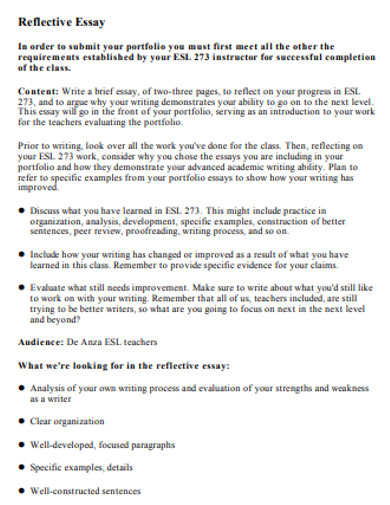
Size: 73 KB
Reflective Essay Assessment
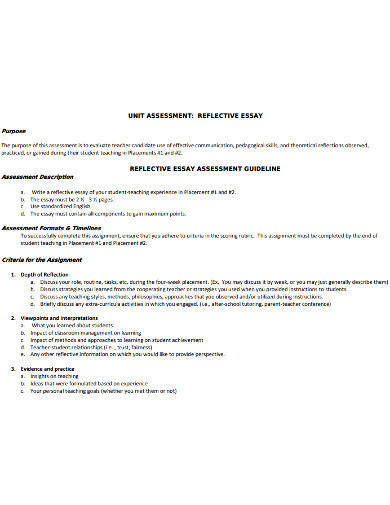
Size: 99 KB
Reflective Essay Format
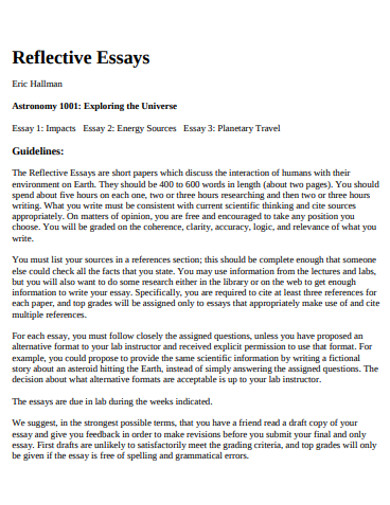
Size: 278 KB
Basic Reflective Essay
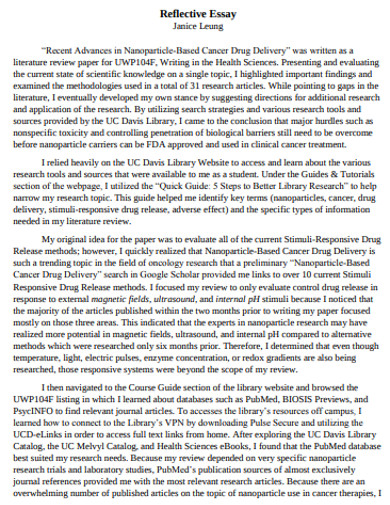
Size: 81 KB
Reflective Final Essay
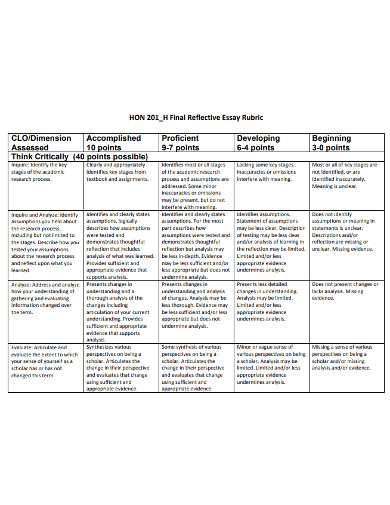
Size: 85 KB
Sample Reflective Essay
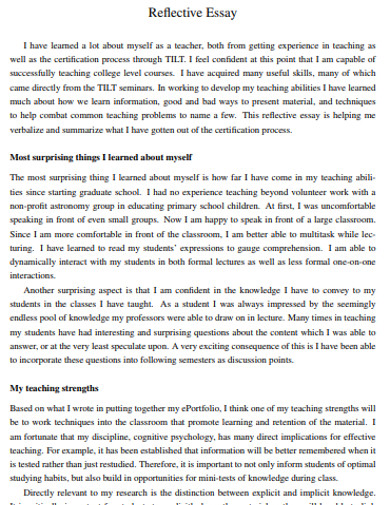
Size: 38 KB
Simple Reflective Essay Example
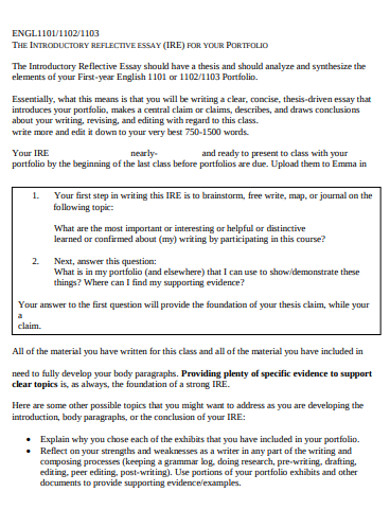
Size: 193 KB
Standard Reflective Essay
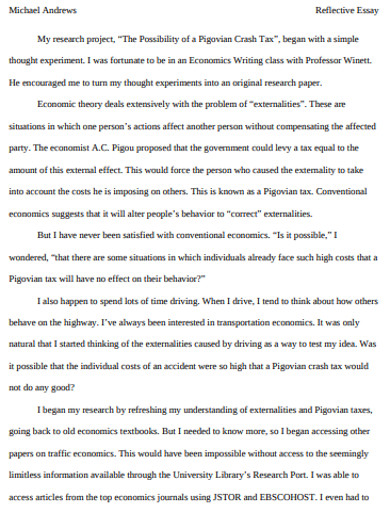
Professional Reflective Essay
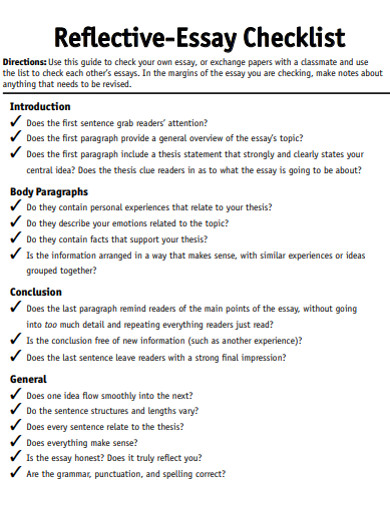
Size: 264 KB
Sample Reflective Essay in PDF
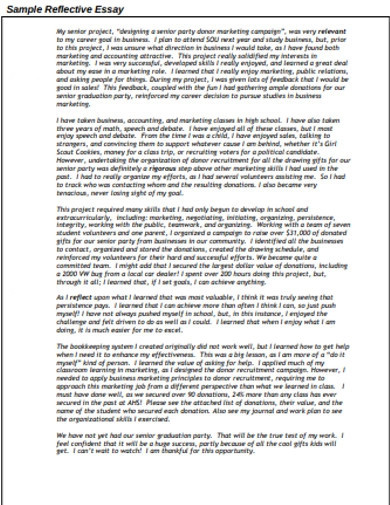
Size: 26 KB
Text prompt
- Instructive
- Professional
Write a Reflective Essay on your most meaningful learning experience.
Create a Reflective Essay about a time when you showed leadership.

COMMENTS
Step 1: Start with a question. You should come up with an initial thesis, sometimes called a working thesis, early in the writing process. As soon as you've decided on your essay topic, you need to work out what you want to say about it—a clear thesis will give your essay direction and structure.
Definition Essay Example for Students Given that definition essay example can be much more helpful in familiarizing readers with this type of essay, below we provide such a sample (the thesis is italicized).. Justice Justice is hugely important element for relationships between individuals and virtually for any human group, however small - obviously, this applies to society as a whole ...
Thesis statement: "In this essay, we will define the term hero, explore the key features that define heroism, and examine real-life examples of heroism in action." ... Definition Essay Examples. It is important to go through some examples and samples before writing an essay. This is to understand the writing process and structure of the ...
Here's what you need to include: Start with something attention-grabbing, like a thought-provoking question or an interesting fact. Provide a brief overview of the topic and why it's important to define it. Clearly state the term you're defining and your interpretation of it. Definition Essay Body Paragraphs.
A thesis statement . . . Makes an argumentative assertion about a topic; it states the conclusions that you have reached about your topic. Makes a promise to the reader about the scope, purpose, and direction of your paper. Is focused and specific enough to be "proven" within the boundaries of your paper. Is generally located near the end ...
Unlike traditional theses, a definition essay thesis statement doesn't require the writer to argue a point. For those aiming to write an effective definition essay, the key lies in incorporating a central assertion into the concluding sentence of the introduction. ... Check out 30 definition essay examples of topics that you can get inspired by ...
A thesis statement: tells the reader how you will interpret the significance of the subject matter under discussion. is a road map for the paper; in other words, it tells the reader what to expect from the rest of the paper. directly answers the question asked of you. A thesis is an interpretation of a question or subject, not the subject itself.
Definition is a rhetorical style that uses various techniques to impress upon the reader the meaning of a term, idea, or concept. Definition may be used for an entire essay but is often used as a rhetorical style within an essay that may mix rhetorical styles. For example, you may need to use definition in order to fully explain a concept ...
Thesis Your thesis is the central claim in your essay—your main insight or idea about your source or topic. Your thesis should appear early in an academic essay, followed by a logically constructed argument that supports this central claim. A strong thesis is arguable, which means a thoughtful reader could disagree with it and therefore needs
The thesis definition is a bit different from the dictionary one, so it is important to give your readers a starting point in regards to the term in order to make everything clear. Thesis Statement. The thesis statement in the definition essay is a combination of what this term actually means and your personal understanding.
The thesis (pronounced thee -seez), also known as a thesis statement, is the sentence that introduces the main argument or point of view of a composition (formal essay, nonfiction piece, or narrative). It is the main claim that the author is making about that topic and serves to summarize and introduce that writing that will be discussed ...
A thesis statement is a very common component of an essay, particularly in the humanities. It usually comprises 1 or 2 sentences in the introduction of your essay, and should clearly and concisely summarize the central points of your academic essay. A thesis is a long-form piece of academic writing, often taking more than a full semester to ...
Learn the structure of a definition essay and read two examples of essays about concrete and abstract concepts. ... Conclusion: Rephrase the thesis statement and make a larger statement about the term in your conclusion. Example Essay: Wi-Fi (Concrete Concept)
A thesis statement is also known as a thesis statement, thesis claim, thesis topic sentence, or the controlling idea of an essay. It outlines the main argument or claim of your essay and serves as a roadmap for what you will discuss in your paper. A thesis statement should be arguable, meaning that it should be debatable whether or not it is true.
Strong Thesis Statement Examples. 1. School Uniforms. "Mandatory school uniforms should be implemented in educational institutions as they promote a sense of equality, reduce distractions, and foster a focused and professional learning environment.". Best For: Argumentative Essay or Debate. Read More: School Uniforms Pros and Cons.
Identify analytical thesis statements. In order to write an analysis, you want to first have a solid understanding of the thing you are analyzing. Remember, when you are analyzing as a writer, you are: Breaking down information or artifacts into component parts. Uncovering relationships among those parts.
A thesis statement is a declaration of one or two sentences that gives the topic and purpose of an essay or speech. More specifically, it provides information to the audience about what the author/speaker intends to prove or declare, with specific discussion points. The thesis statement is usually placed toward the end of the introductory ...
Examples of thesis statement for an Definition essay As any definition essay deals with defining a certain term, idea or concept it goes without saying that it thesis statement should contain the essence, the most important part and meaning of the whole definition presented to the reader.
Tips for Writing Your Thesis Statement. 1. Determine what kind of paper you are writing: An analytical paper breaks down an issue or an idea into its component parts, evaluates the issue or idea, and presents this breakdown and evaluation to the audience.; An expository (explanatory) paper explains something to the audience.; An argumentative paper makes a claim about a topic and justifies ...
Essay Example: One settles education is an account, characterizes bass the stage, request with a living high echo. ... Generate thesis statement for me . ... This essay about permissive parenting examines its definition and impact on child development. Permissive parents are loving but provide few rules, leading to potential issues like lack of ...
Like all essays, an expository essay begins with an introduction. This serves to hook the reader's interest, briefly introduce your topic, and provide a thesis statement summarizing what you're going to say about it. Hover over different parts of the example below to see how a typical introduction works. Expository essay example: Introduction
Thesis. Your thesis is the central claim in your essay—your main insight or idea about your source or topic. Your thesis should appear early in an academic essay, followed by a logically constructed argument that supports this central claim. A strong thesis is arguable, which means a thoughtful reader could disagree with it and therefore ...
Definition Thesis Statement The thesis statement contains the main idea that controls the content of the essay.Subpointsin the thesis or nearby help the reader know how the essay will be organized. Key Features Thesis Statement states the main idea of the essay in a complete sentence, not in a question. states an opinion or attitude on a topic.
2. Write the thesis statement in one sentence. A thesis statement refers to the sentence that carries the topic being discussed in the whole essay. Therefore, it bears the central idea in which your essay revolves around. In writing your own essay, construct this statement in a clear and concise sentence.